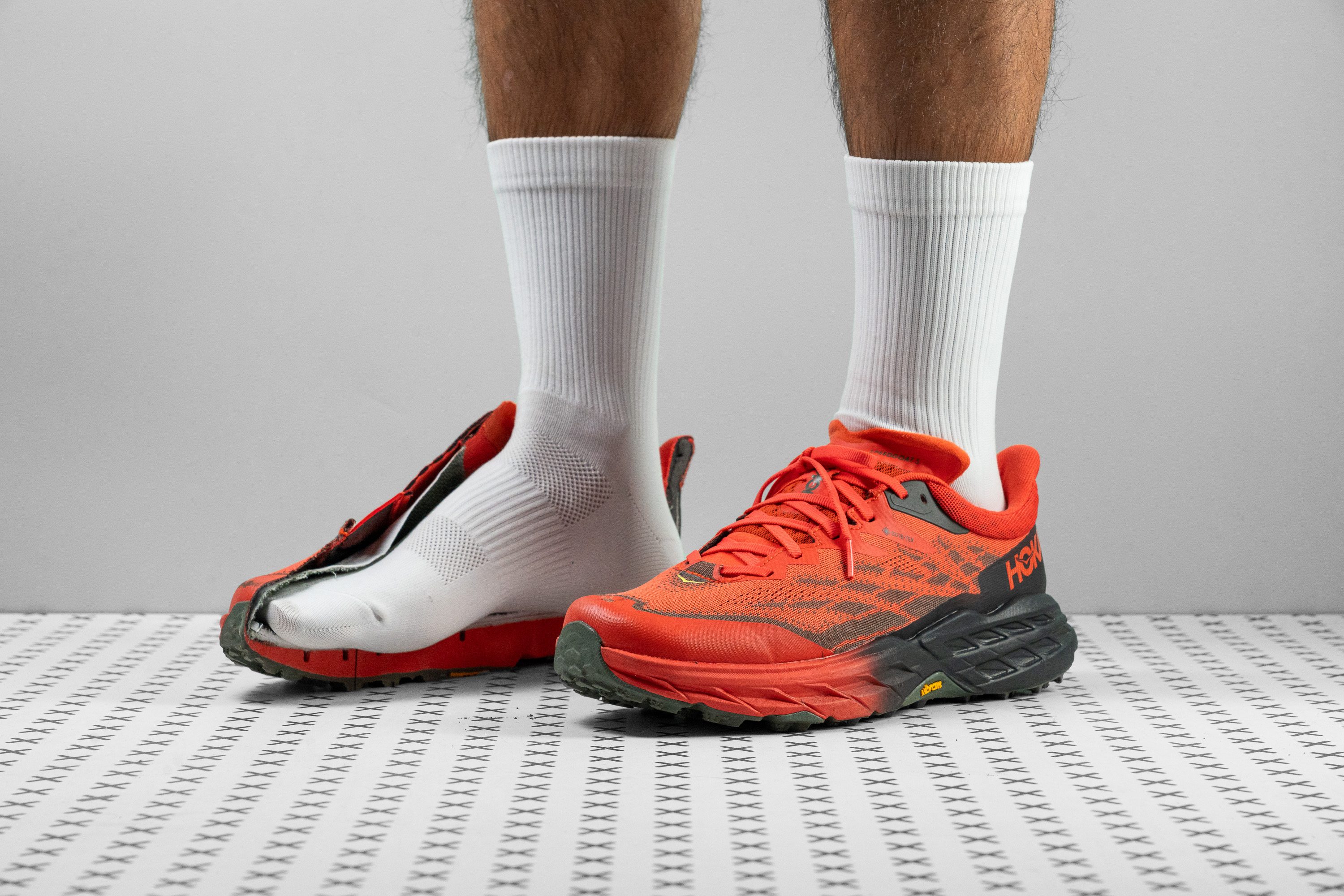Our verdict
- Top pick in best winter running shoes (2023)
- Top pick in best waterproof running shoes (2023)
Pros
- Plush, cushioned midsole
- Exceptional stability
- Remarkable breathability for a Gore-Tex shoe
- Spacious enough for most foot types
- Well-suited for ultra marathons
- Superior grip on easy and moderate trails
- Vibram Megagrip outsole
- Utilises recycled materials in the upper
Cons
- Simply too heavy
- Midsole hardens noticeably in cold temperatures
- Could benefit from increased flexibility
Audience verdict
Comparison
The most similar running shoes compared
+ + Add a shoe | |||||
|---|---|---|---|---|---|
| Audience score | 82 Good! | 75 Bad! | 75 Bad! | 75 Bad! | |
| Price | £160 | £145 | £160 | £105 | |
| Trail terrain | Moderate | Light | Moderate | Light | |
| Shock absorption | - | Moderate | - | - | |
| Energy return | - | Moderate | - | - | |
| Arch support | Neutral | Neutral | Neutral | Neutral | |
| Weight lab Weight brand | 11.3 oz / 319g 11.5 oz / 326g | 9.9 oz / 281g 10.6 oz / 300g | 10.2 oz / 289g 10.4 oz / 295g | 10.3 oz / 293g 11.4 oz / 323g | |
| Drop lab Drop brand | 7.0 mm 4.0 mm | 8.3 mm 9.5 mm | 5.0 mm 5.0 mm | 10.2 mm 9.0 mm | |
| Strike pattern | Mid/forefoot | HeelMid/forefoot | Mid/forefoot | Heel | |
| Size | True to size | Slightly small | Slightly small | True to size | |
| Midsole softness | Soft | Soft | Balanced | Firm | |
| Difference in midsole softness in cold | Big | Normal | Small | Small | |
| Toebox durability | Good | Decent | Very good | Very good | |
| Heel padding durability | Good | Bad | Good | Good | |
| Outsole durability | Decent | Good | Good | Good | |
| Breathability | Moderate | Warm | Warm | Warm | |
| Width / fit | Medium | Medium | Medium | Wide | |
| Toebox width | Medium | Wide | Narrow | Wide | |
| Stiffness | Stiff | Moderate | Stiff | Stiff | |
| Torsional rigidity | Stiff | Stiff | Stiff | Stiff | |
| Heel counter stiffness | Moderate | Flexible | Moderate | Moderate | |
| Lug depth | 3.5 mm | 3.6 mm | 3.9 mm | 2.7 mm | |
| Heel stack lab Heel stack brand | 34.6 mm | 32.1 mm 37.0 mm | 32.9 mm 37.0 mm | 34.5 mm 35.0 mm | |
| Forefoot lab Forefoot brand | 27.6 mm | 23.8 mm 27.5 mm | 27.9 mm 32.0 mm | 24.3 mm 26.0 mm | |
| Widths available | Normal | Normal | NormalWide | NormalWide | |
| Season | Winter | Winter | Winter | Winter | |
| Removable insole | ✓ | ✓ | ✓ | ✓ | |
| Orthotic friendly | ✓ | ✓ | ✓ | ✓ | |
| Waterproofing | Waterproof | Waterproof | Waterproof | Waterproof | |
| Ranking | #554 Bottom 19% | #359 Bottom 6% | #362 Bottom 5% | #360 Bottom 6% | |
| Popularity | #374 Bottom 45% | #123 Top 33% | #112 Top 30% | #249 Bottom 34% |
Who should buy
We concluded that the Hoka Speedgoat 5 GTX is an excellent choice for:
- Enthusiasts of Hoka trail shoes looking for a waterproof addition to their collection.
- Runners seeking a versatile, Gore-Tex running shoe that's capable on trails and even occasional road use.
- Trail runners in need of a winter-ready shoe with a Vibram Megagrip outsole for enhanced grip.
- Those looking for a Gore-Tex shoe that also offers good breathability.
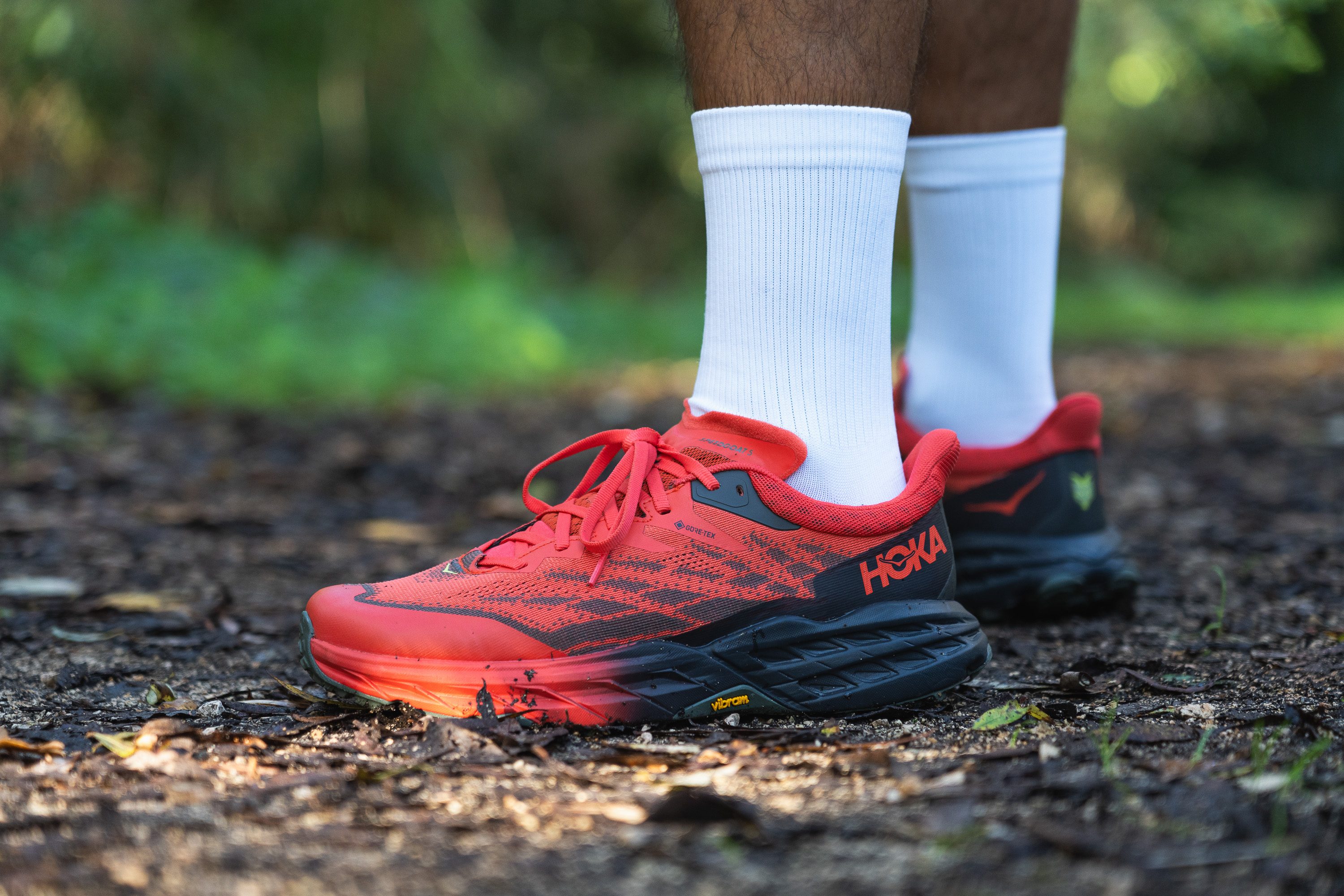
Who should NOT buy
The Hoka Speedgoat 5 GTX is undeniably heavy, and there's no getting around that fact. If lightness is your priority, we think it's a good idea to skip the waterproof feature due to the Gore-Tex membrane's weight.
In this case, we suggest considering the non-GTX Speedgoat 5 or the Nike Pegasus Trail 4. For ultra runners prioritising speed and a carbon plate over waterproofing, the Nike Ultrafly is worth a look.
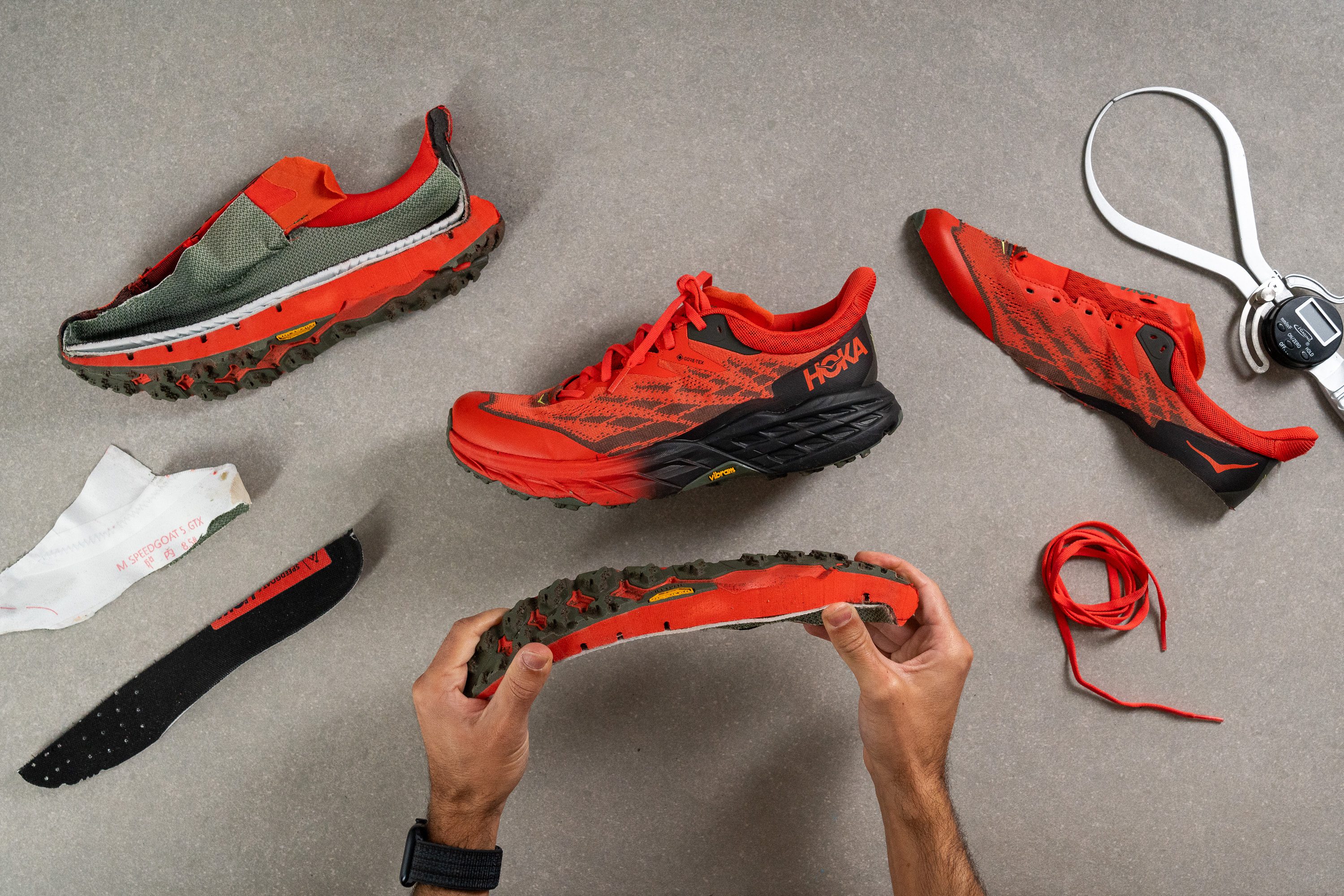
Another aspect that didn't impress us in the lab was the Speedgoat 5 GTX's performance on extremely challenging terrains, like mud. For such conditions, a shoe with larger, chevron-shaped lugs, like the Salomon Speedcross 6 GTX, will offer superior performance.
Cushioning
Heel stack
The Speedgoat 5 GTX, with its 34.6 mm stack height, offers a high cushioning level, enabling runners to tackle long distances on trails. It's even suitable for those ultra races with river crossings or wet conditions.
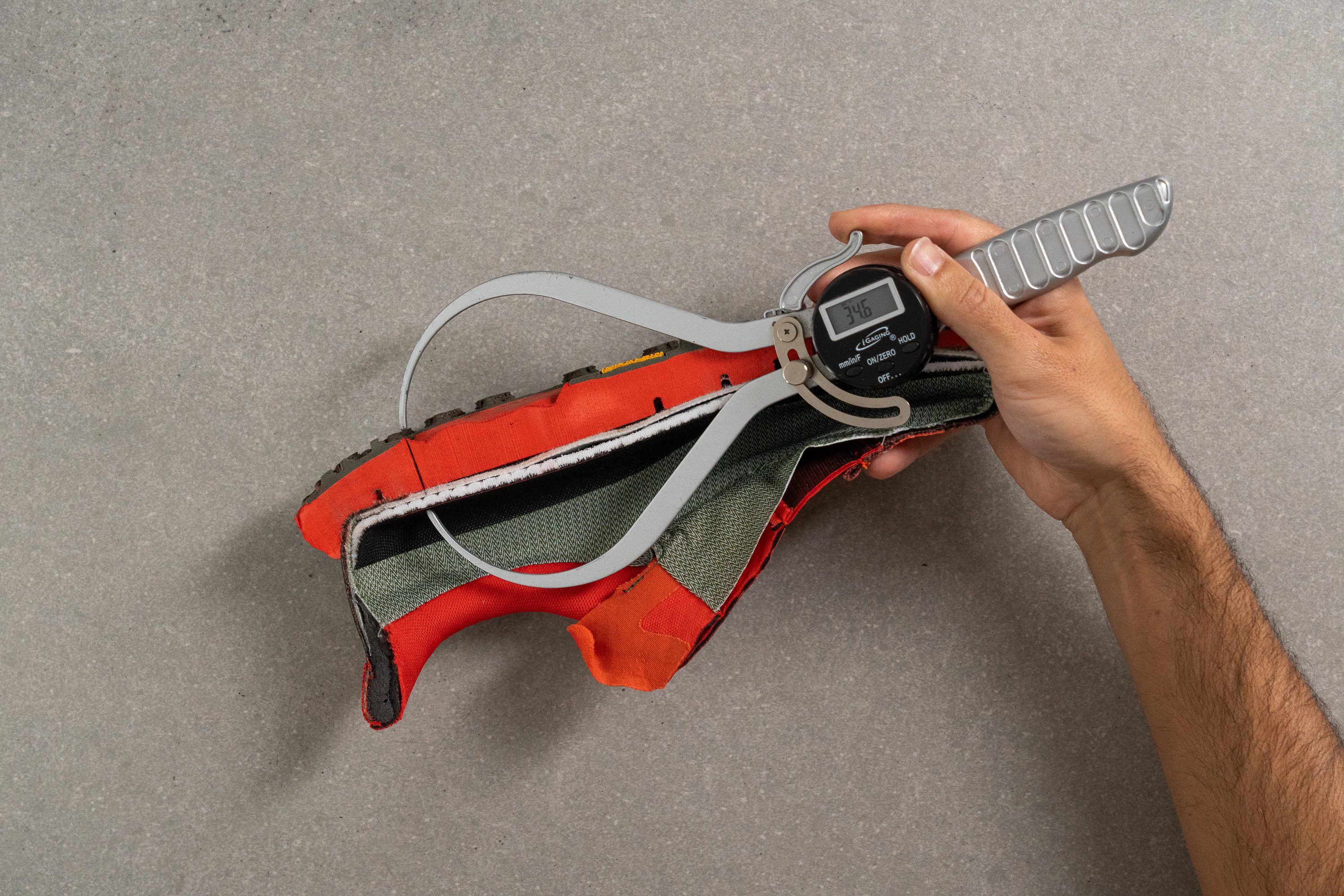
| Hoka Speedgoat 5 GTX | 34.6 mm |
| Average | 32.6 mm |
Forefoot stack
In the forefoot, we measured 27.6 mm, which is above the average and provides a fantastic amount of protection.
Midfoot and forefoot strikers can be confident they'll have plenty of cushioning!
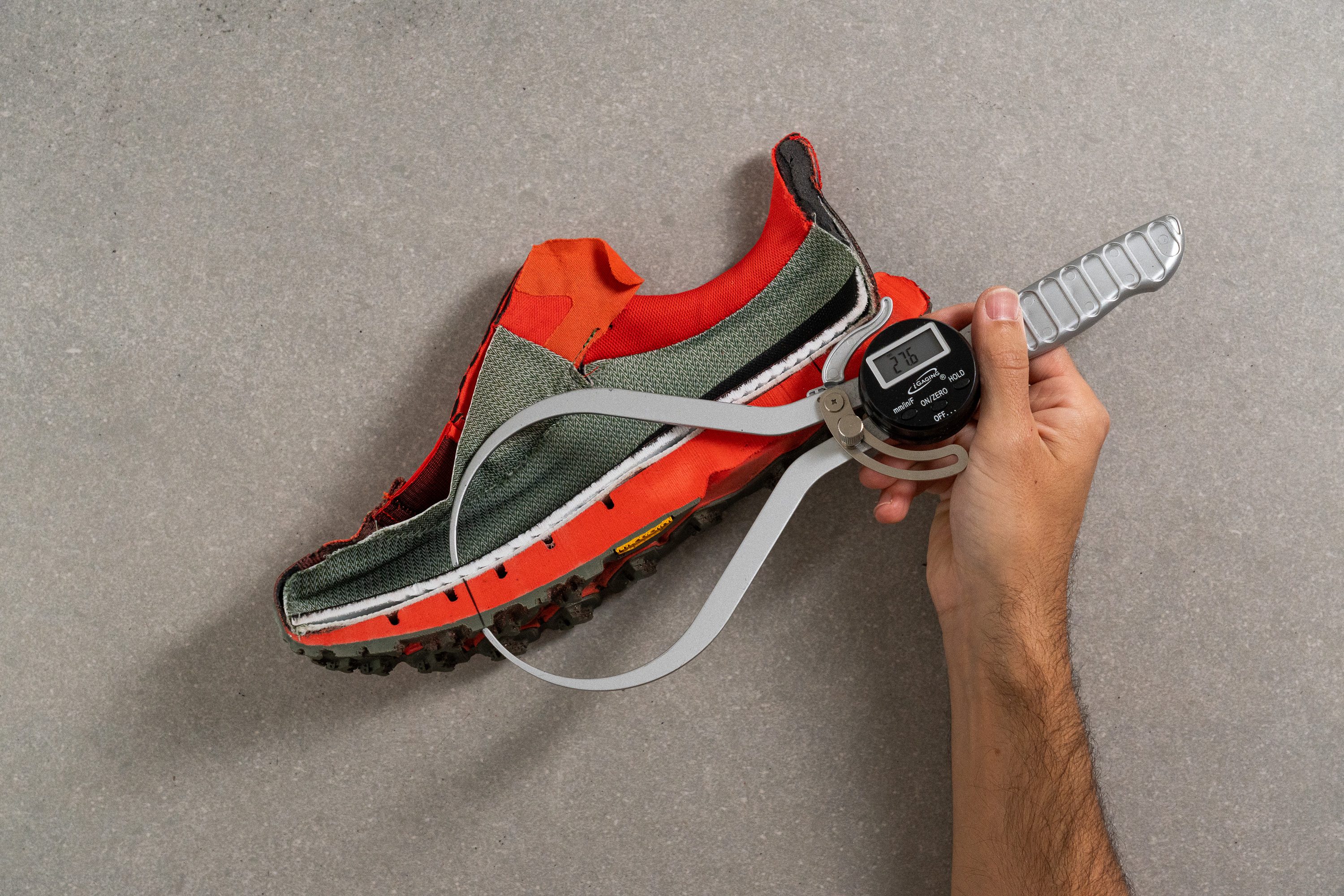
| Hoka Speedgoat 5 GTX | 27.6 mm |
| Average | 25.1 mm |
Drop
We noticed a 7.0-mm drop from the forefoot to the heel, which is quite different from Hoka's stated 4-mm drop. But remember, in our lab, we stick to World Athletics guidelines.
It's interesting to see these differences between what brands say and our findings. To understand more about why this happens, check out our detailed guide.
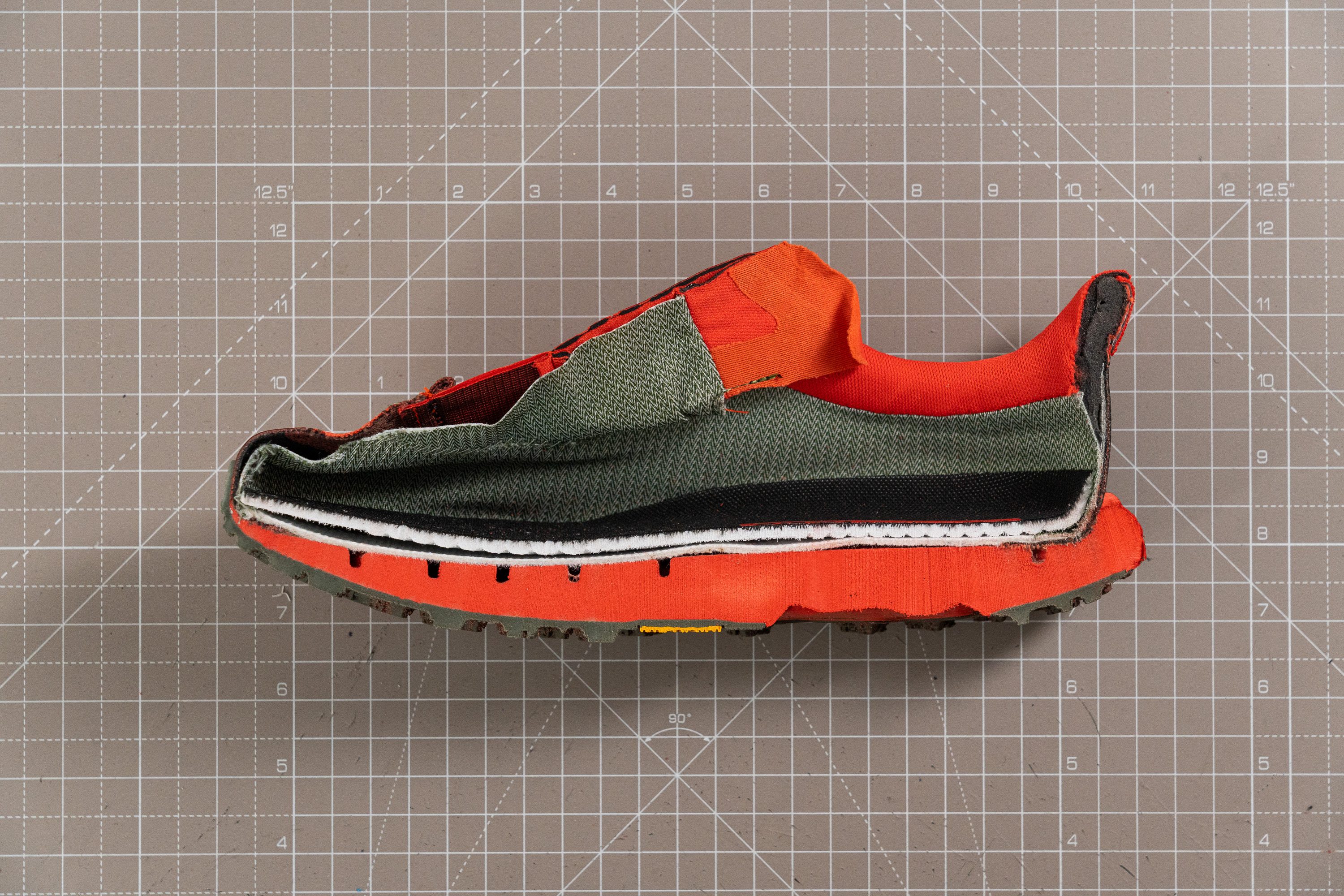
| Hoka Speedgoat 5 GTX | 7.0 mm |
| Average | 7.6 mm |
Midsole softness
In the midsole, we found CMEVA foam. This means no superfoams like PEBA for the Speedgoat 5 yet, and we don't expect them anytime soon.
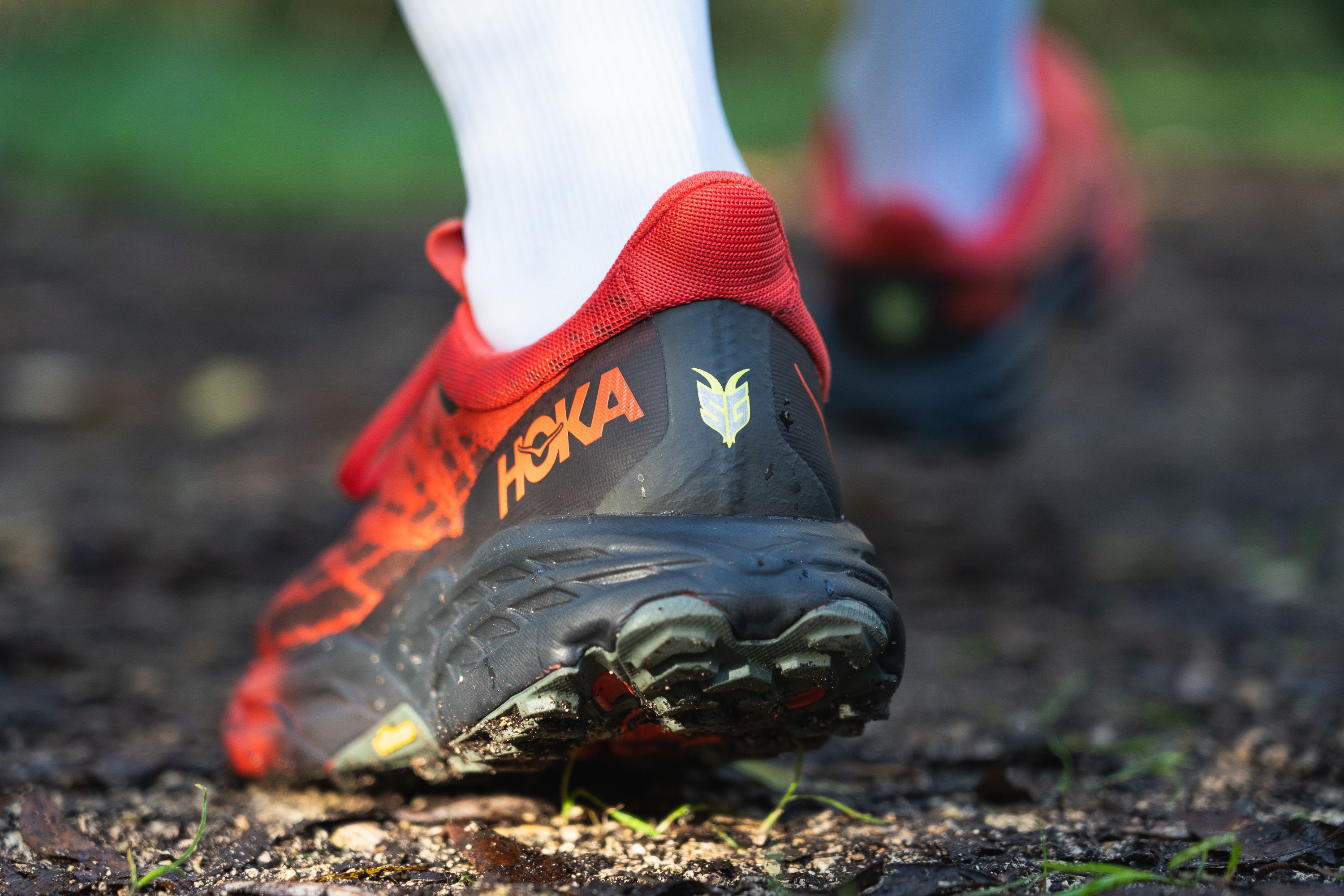
But, this foam performs really well, definitely enhancing the performance compared to regular EVA foam.
It's bouncy, comfortable, and softer than many running shoes. It scored 19.4 HA on our durometer test. To get an accurate result, we measured it after cutting the shoe in half, which is a necessary step.
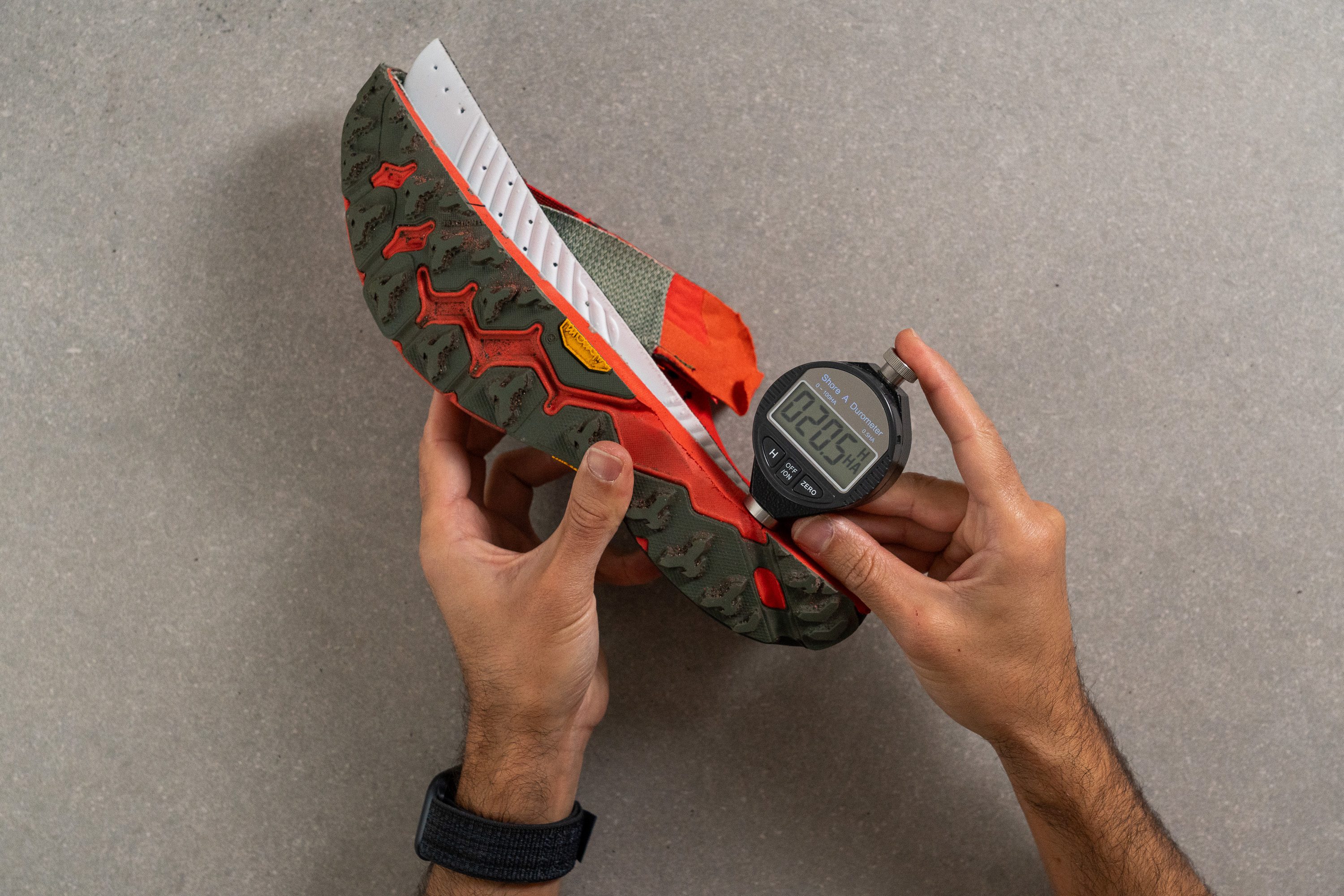
| Hoka Speedgoat 5 GTX | 19.4 HA |
| Average | 22.0 HA |
Size and fit
Size
Hoka Speedgoat 5 GTX fits true to size (35 votes).
Width / Fit
The fit is very comfortable, but don't expect a shoe crafted for those with wide feet.
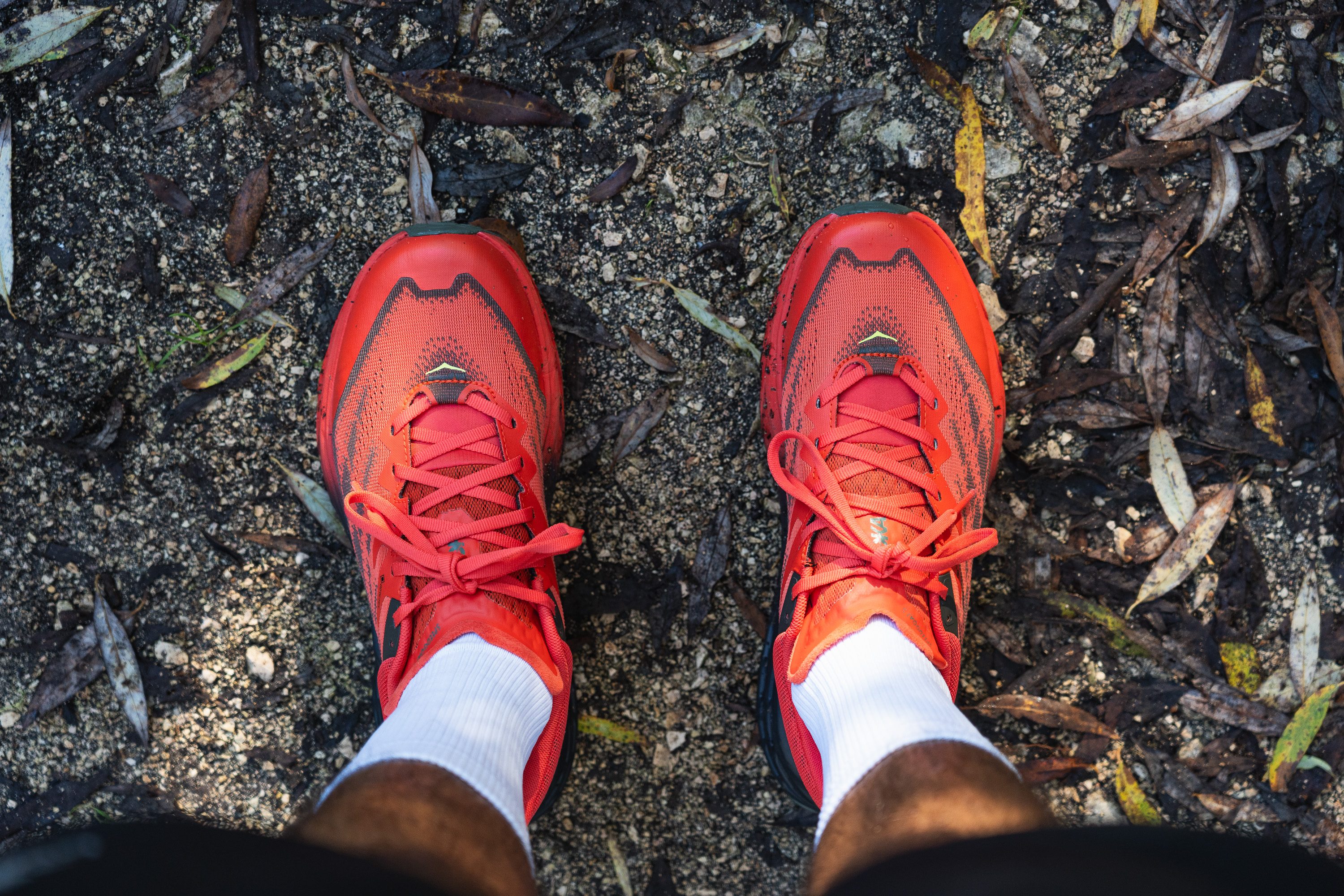
At 99.1 mm, it's designed to be comfortable but, at the same time, to enhance stability. We think this is the right approach for this shoe. However, if you plan on racing ultras, consider going half size up.
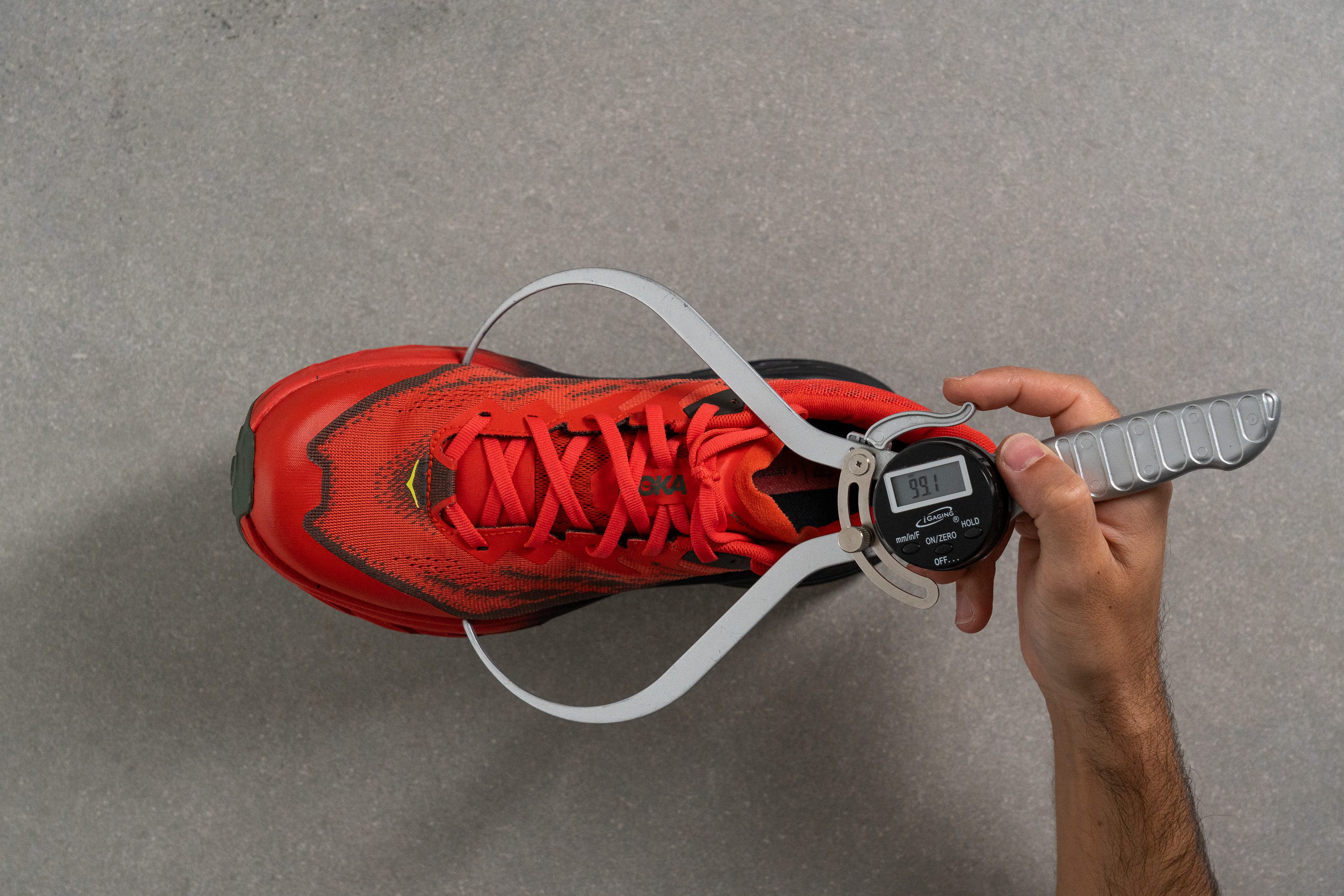
This test follows an older methodology, which is why you don't see recently tested shoes in the chart. Results from different methodologies can not be compared.
| Hoka Speedgoat 5 GTX | 99.1 mm |
| Average | 98.9 mm |
Toebox width
The area around the big toe isn't very tapered, measuring 79.1 mm. It offers a regular fit, maybe slightly roomier than other Hokas.
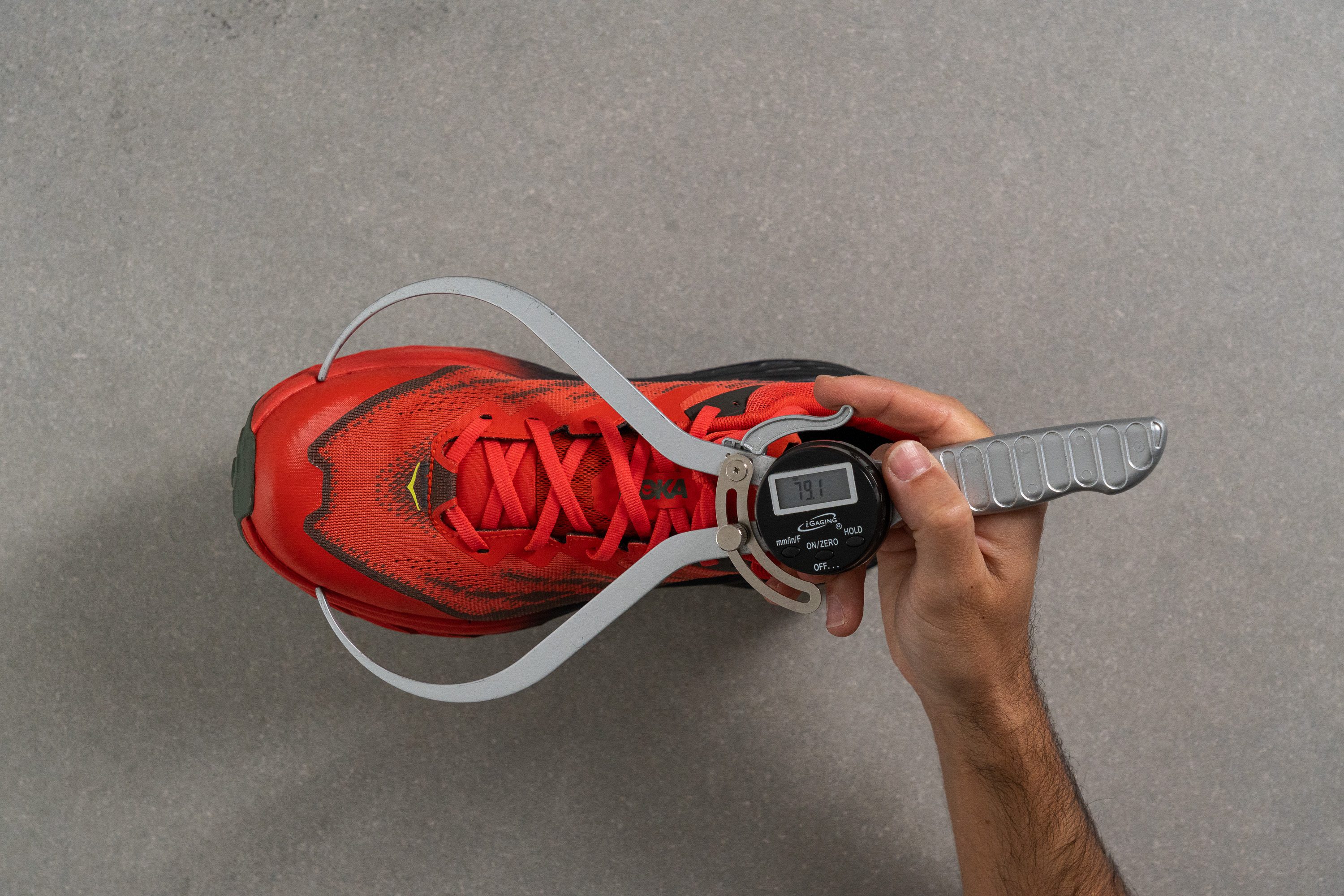
This test follows an older methodology, which is why you don't see recently tested shoes in the chart. Results from different methodologies can not be compared.
| Hoka Speedgoat 5 GTX | 79.1 mm |
| Average | 79.3 mm |
Traction / Grip
Lug depth
The Speedgoat 5 GTX is a trail running shoe designed to handle all kinds of terrain. Its 3.5 mm lugs are of average length, versatile enough to manage wet, sticky single tracks and still perform well on harder, packed trails.
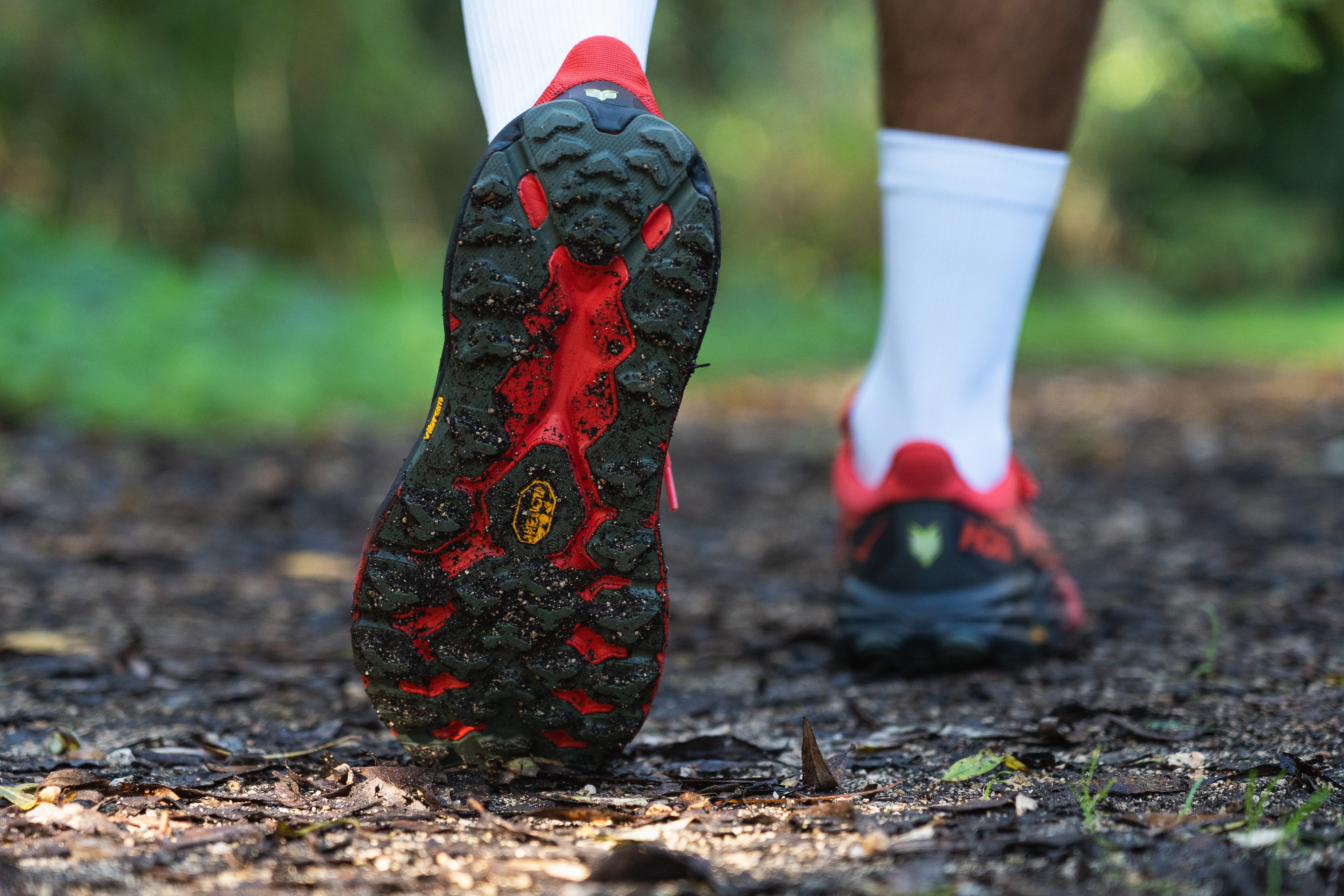
We tested the shoe across a wide range of terrains. From our experience, it performed at its best on easy-to-moderate trails and gravel roads.
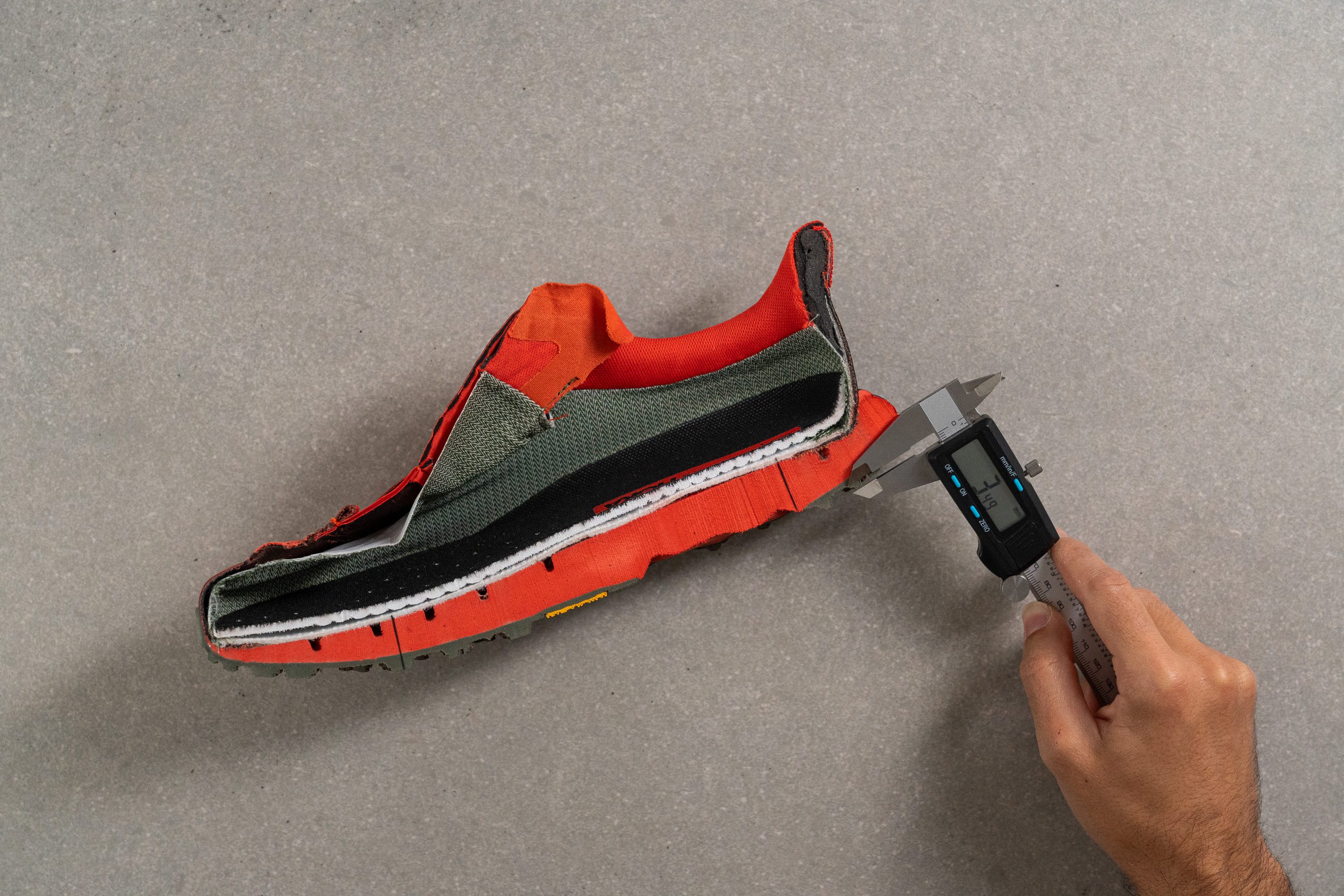
| Hoka Speedgoat 5 GTX | 3.5 mm |
| Average | 3.5 mm |
Flexibility / Stiffness
Since it doesn't have a rock plate or a carbon-fibre plate, we expected a low value in our 90-degree bend test, where we assess the shoe's longitudinal stiffness.
Indeed, we ended up with a pretty average value of 29.8N.
This test follows an older methodology, which is why you don't see recently tested shoes in the chart. Results from different methodologies can not be compared.
| Hoka Speedgoat 5 GTX | 29.8N |
| Average | 27.1N |
Stiffness in cold
We repeated the test after freezing the shoe for 20 minutes, similar to what we did with the midsole softness test. This time, the result came in at 34.3N.
| Hoka Speedgoat 5 GTX | 34.3N |
| Average | 35.9N |
Stiffness in cold (%)
That's just a 15.4% difference, showing a very impressive performance from the CMEVA foam, especially compared to what we saw with the midsole softness. This is a good result.
| Hoka Speedgoat 5 GTX | 15% |
| Average | 32% |
Weight
Here's where it gets interesting. In the lab, the Speedgoat 5 GTX weighed in at 11.3 oz or 319g. In comparison, the non-GTX Speedgoat 5 is lighter, tipping the scales at 9.77 oz or 277g. This means it's 15% lighter.
So, the question is, do you need waterproofing enough to give up 1.5 oz of lightness?
| Hoka Speedgoat 5 GTX | 11.3 oz (319g) |
| Average | 10.2 oz (289g) |
Breathability
The Speedgoat 5 GTX features a double-layer jacquard mesh with a Gore-Tex membrane. From our lab testing experiences with Gore-Tex shoes, we expected a low score in breathability—typically a 1 out of 5. But, to our surprise, the Speedgoat 5 GTX earned a 3 out of 5!
Why the higher score? While the toebox lacks airflow, Hoka opened up the tongue, allowing effective heat and moisture escape.
However, water can enter the shoe through the ventilated tongue. So, we recommend not submerging the shoe beyond that level.
When we held the upper to the light, the toebox and medial parts' lack of ventilation was evident—no light passed through.
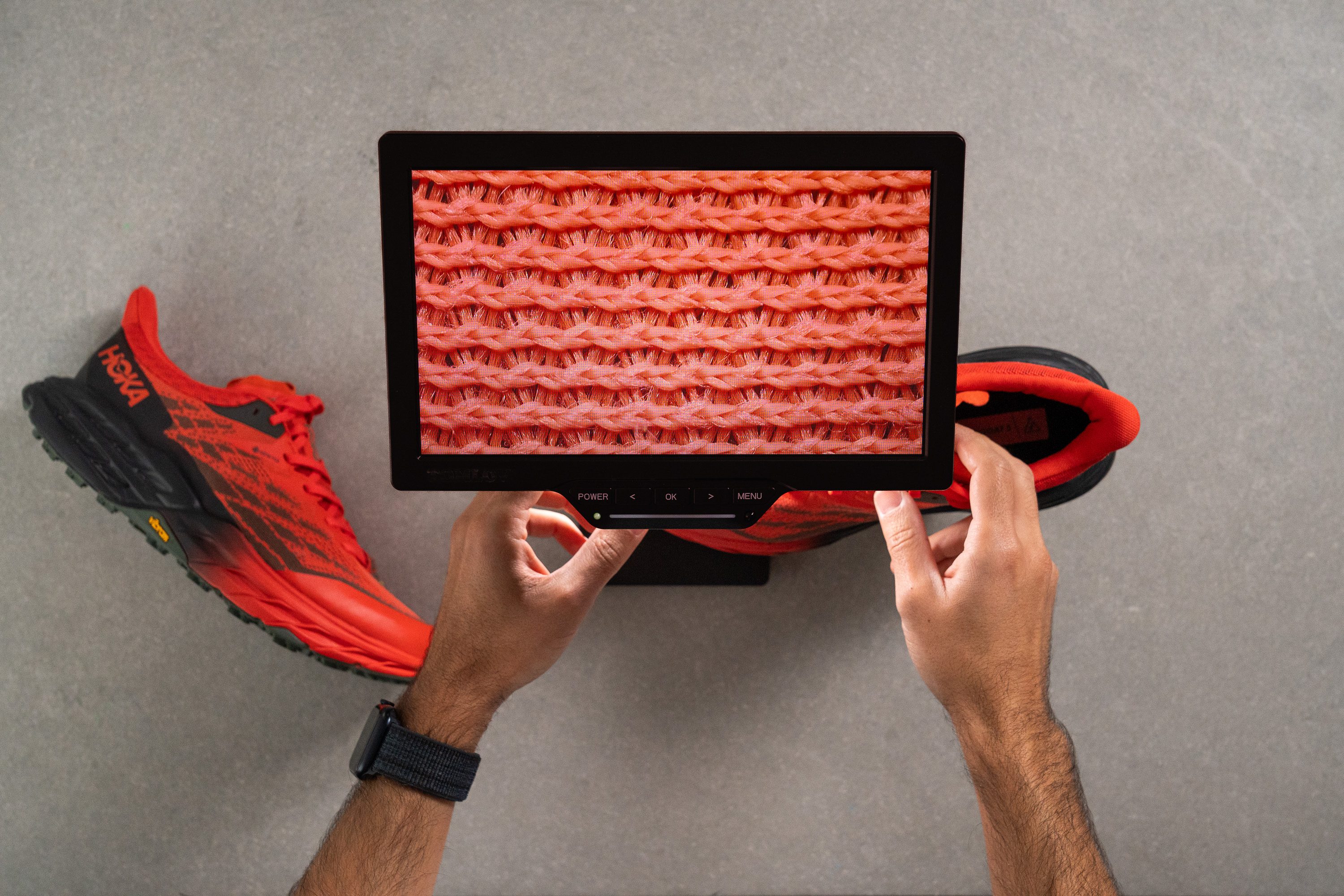
For more evidence, we headed to our lab's microscope.
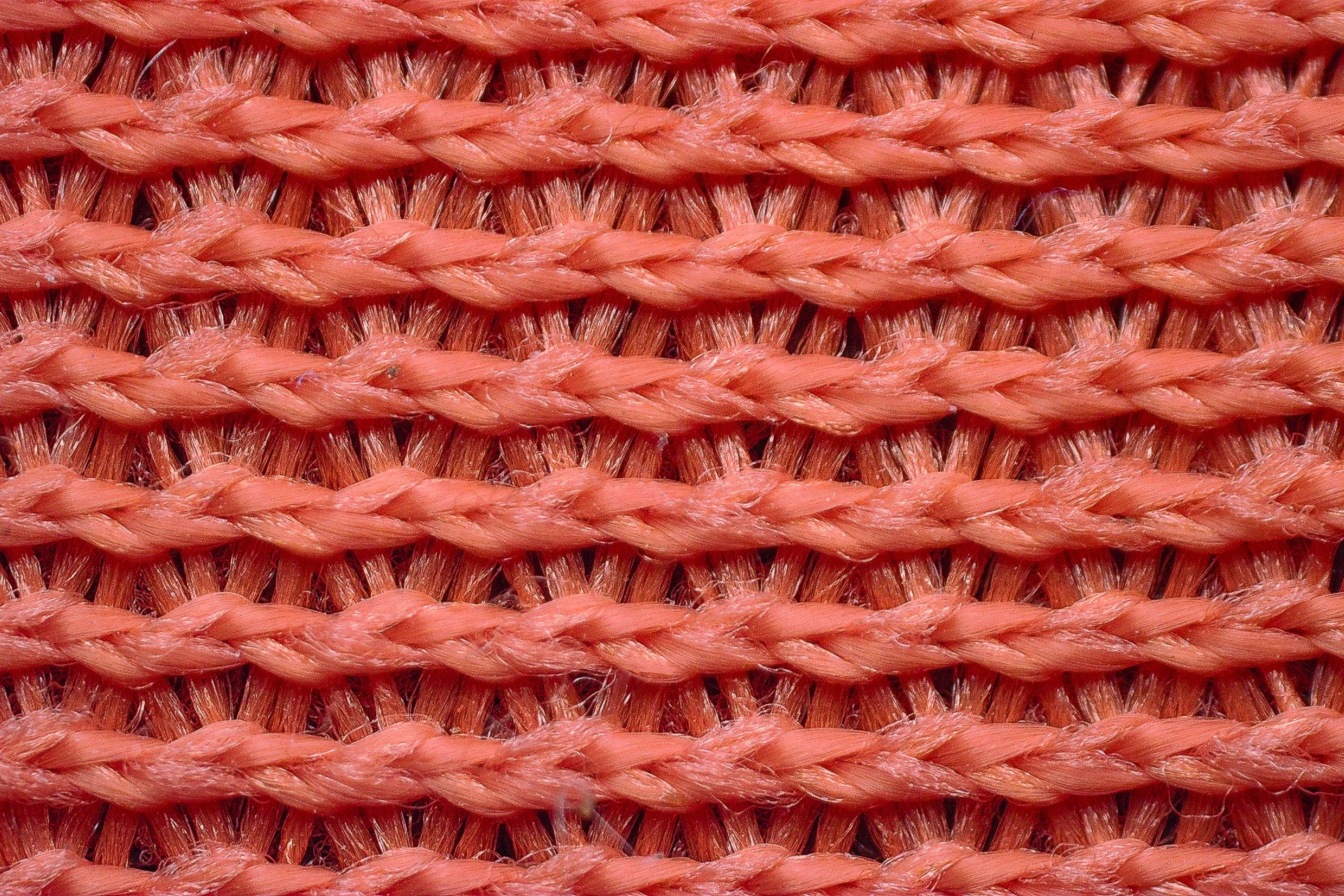
There, we saw the thick, dense mesh we anticipated. After leaving the microscope, we examined the Speedgoat's unique construction.
Unlike most shoes, Hoka positioned the GTX membrane inside rather than outside the upper. Additionally, the mesh is made of 44% recycled materials, which is always a big plus!
| Hoka Speedgoat 5 GTX | 3 |
| Average | 3.3 |
Stability
Lateral stability test
Regarding stability, the Speedgoat 5 GTX offers the same reliable, steady experience as its non-waterproof counterpart.
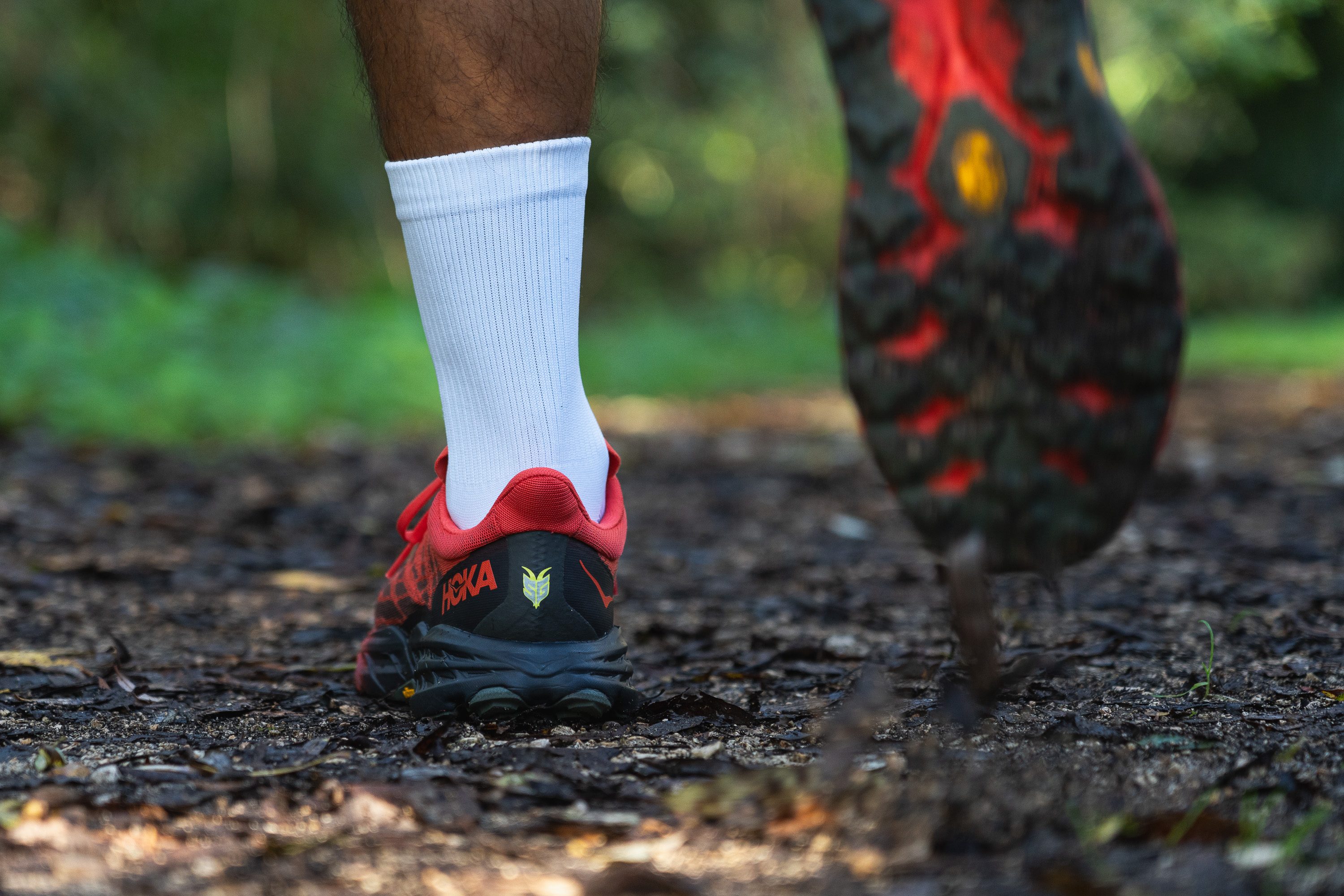
While it's not specifically designed as a stability shoe, even runners needing a bit of support will find they fare quite well in this shoe.
Torsional rigidity
A significant part of the stability in the Speedgoat 5 GTX comes from its high torsional rigidity.
We rated it 4 out of 5, indicating it's quite substantial. So keep in mind that it may feel a bit stiff for those looking for a more flexible trail running experience.
| Hoka Speedgoat 5 GTX | 4 |
| Average | 3.6 |
Heel counter stiffness
The heel counter seemed pretty average to us, offering enough flexibility to be comfortable for any runner. We gave it a 3 out of 5 score, which aligns with most trail shoes. It shows that Hoka chose a safe, risk-free approach here.
| Hoka Speedgoat 5 GTX | 3 |
| Average | 3 |
Midsole width - forefoot
One of the most celebrated aspects of the Speedgoat series is its stability, which might surprise runners at first glance.
Hoka manages to deliver fantastic stability, largely thanks to the previously mentioned torsional stiffness and also the shoe's impressive width. Measuring 116.7 mm, it provides a generous landing platform, effectively preventing the foot from collapsing laterally.
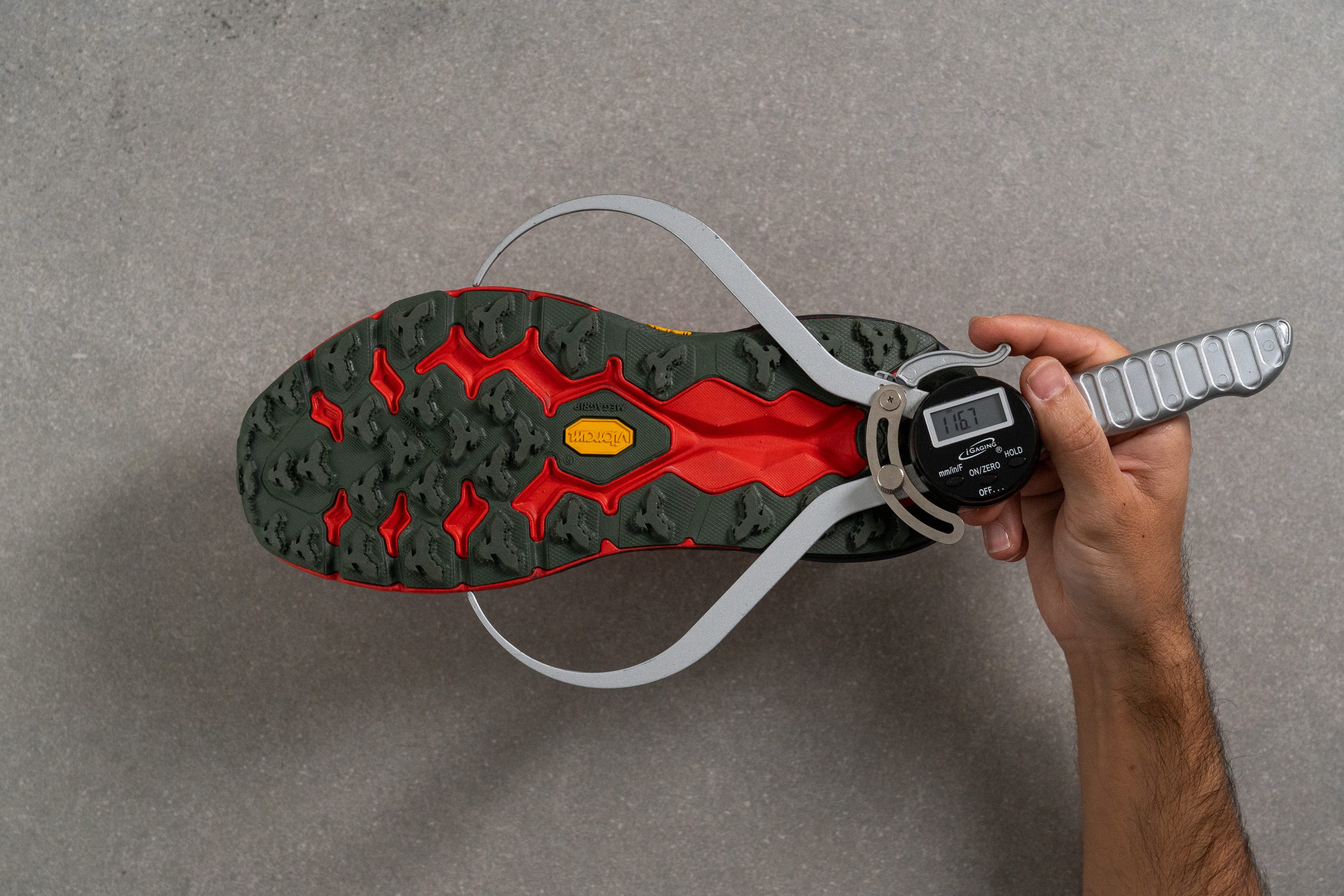
| Hoka Speedgoat 5 GTX | 116.7 mm |
| Average | 112.8 mm |
Midsole width - heel
This benefit isn't just for forefoot strikers.
With 95.3 mm in the heel, the shoe also offers the same width in the rearfoot. This makes it suitable for heel strikers who have mild pronation issues.
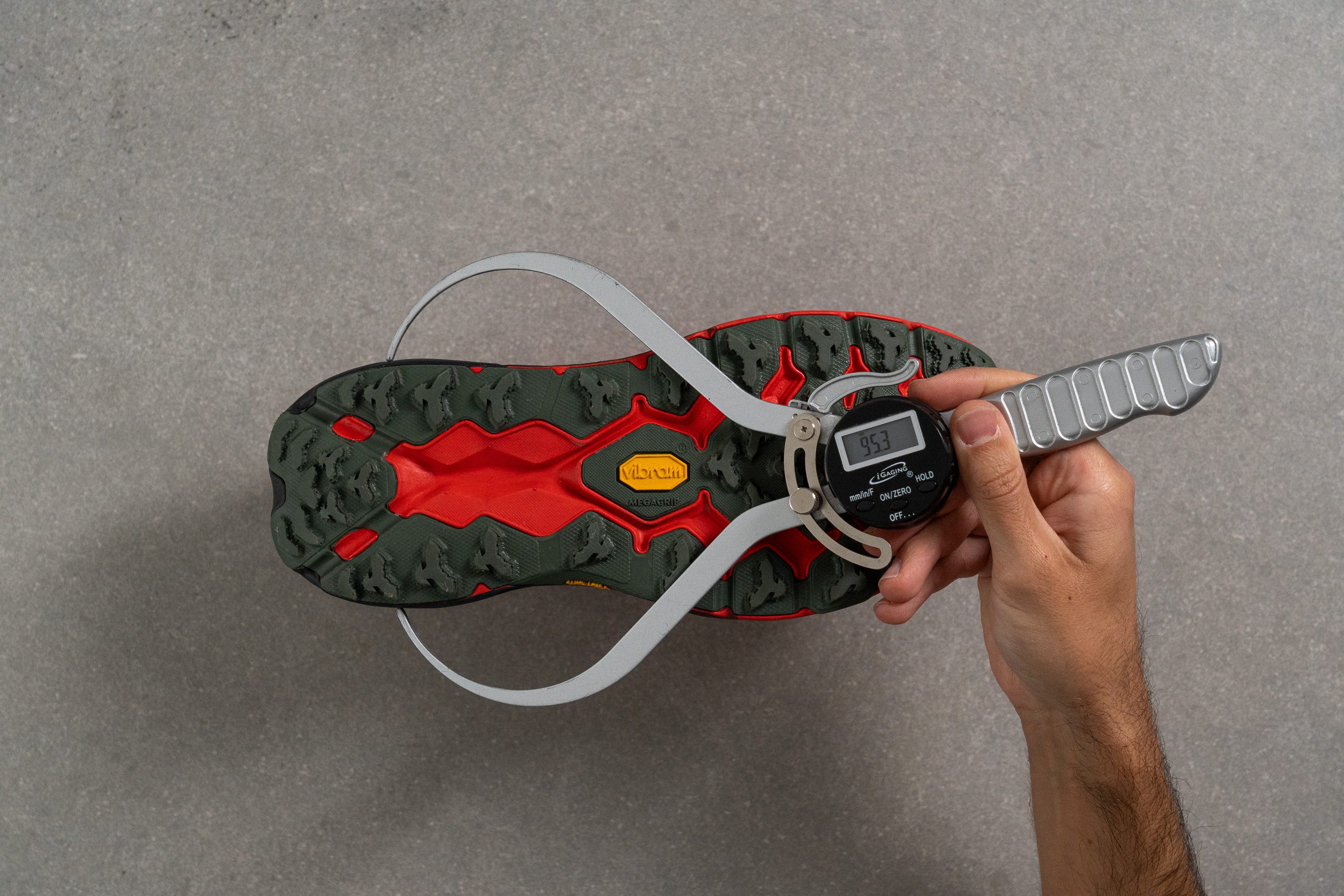
| Hoka Speedgoat 5 GTX | 95.3 mm |
| Average | 89.9 mm |
Durability
Toebox durability
The TPU overlays on the Speedgoat 5 GTX hinted at an impressive result—they cover a significant portion of the mesh.
True to our expectations, in our Dremel test, this shoe scored a 4 out of 5, nearly acing it. You can look forward to exceptional durability, even if you're hitting hard, rocky trails.
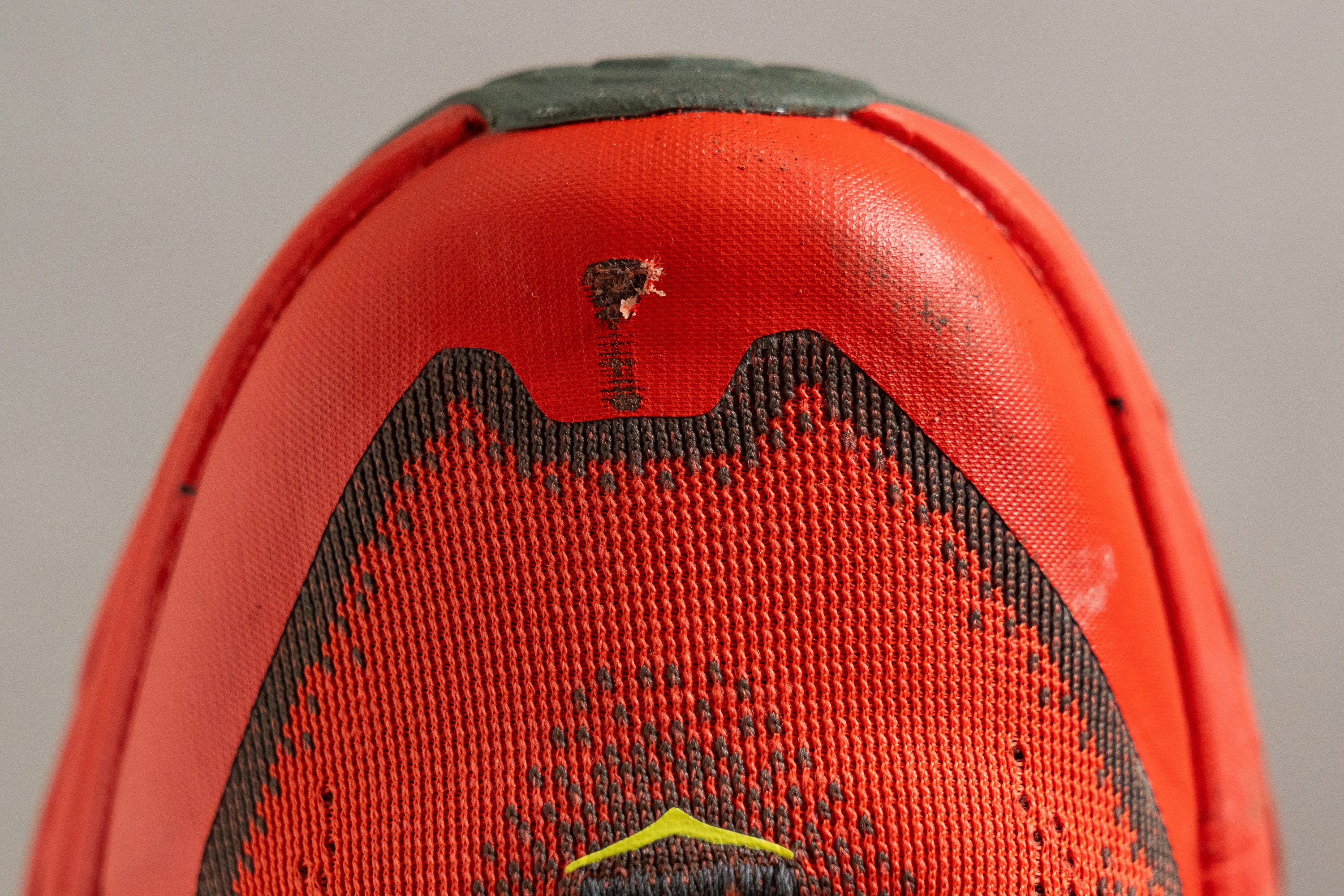
| Hoka Speedgoat 5 GTX | 4 |
| Average | 3.1 |
Heel padding durability
Riding high on the success of our last test, we turned our attention to the heel for another round with the Dremel.
And once again, the Speedgoat 5 GTX impressed us with its stellar performance, elevating it well above the average trail running shoe!
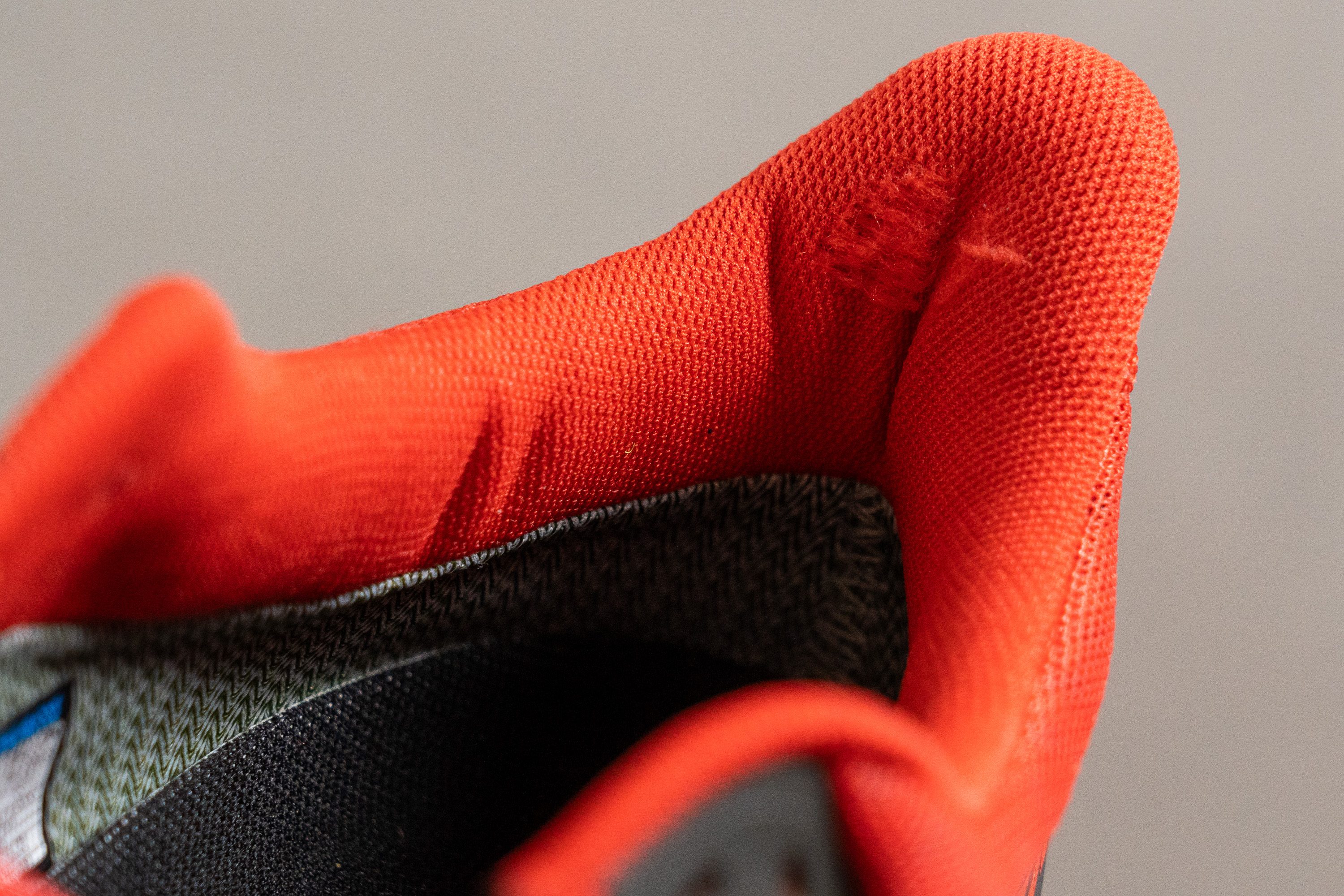
| Hoka Speedgoat 5 GTX | 4 |
| Average | 3 |
Outsole hardness
The outsole, manufactured by the Italian company Vibram, features an 86.0 HC rubber in terms of hardness.
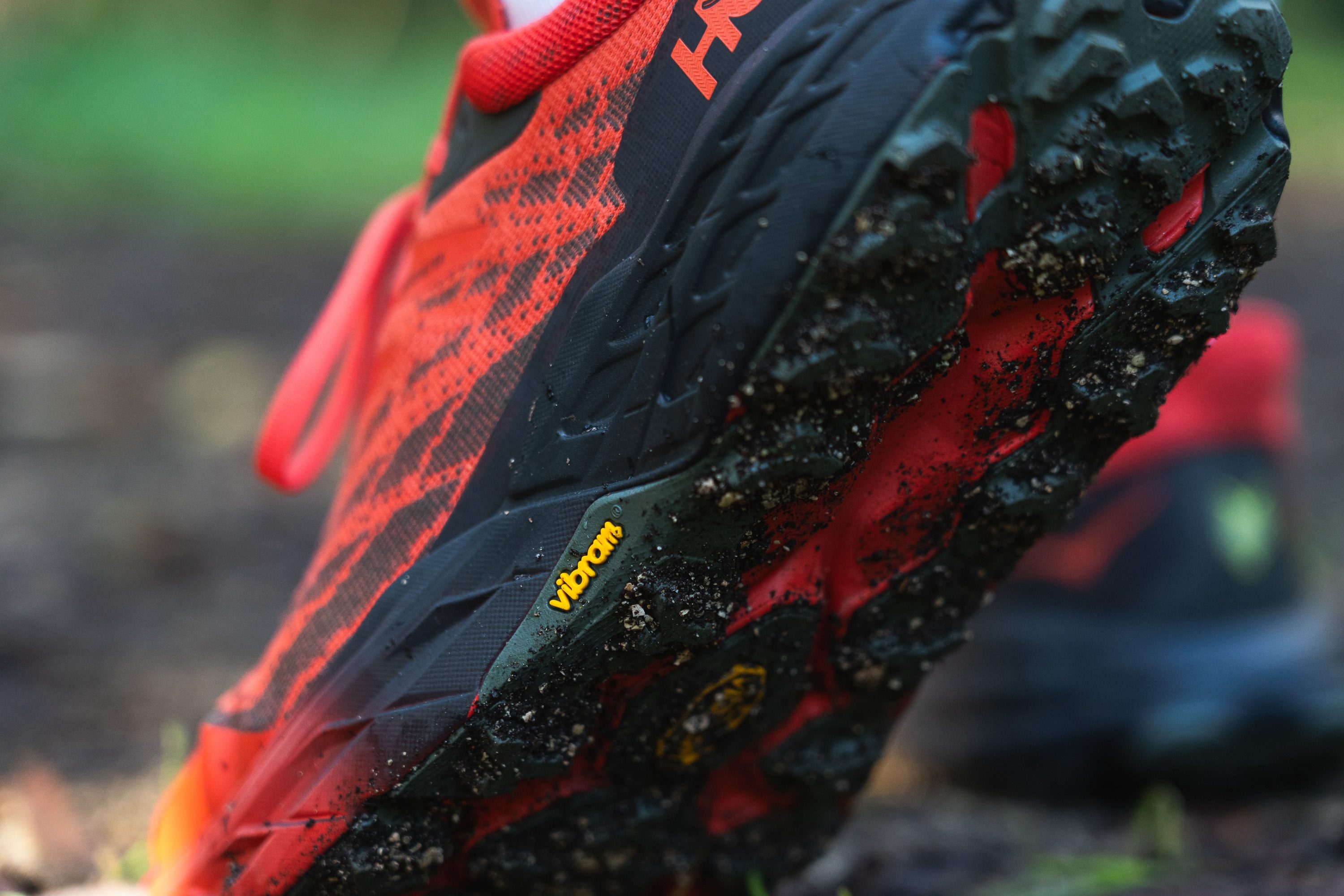
It seems like they're aiming for a balance between grip and durability.
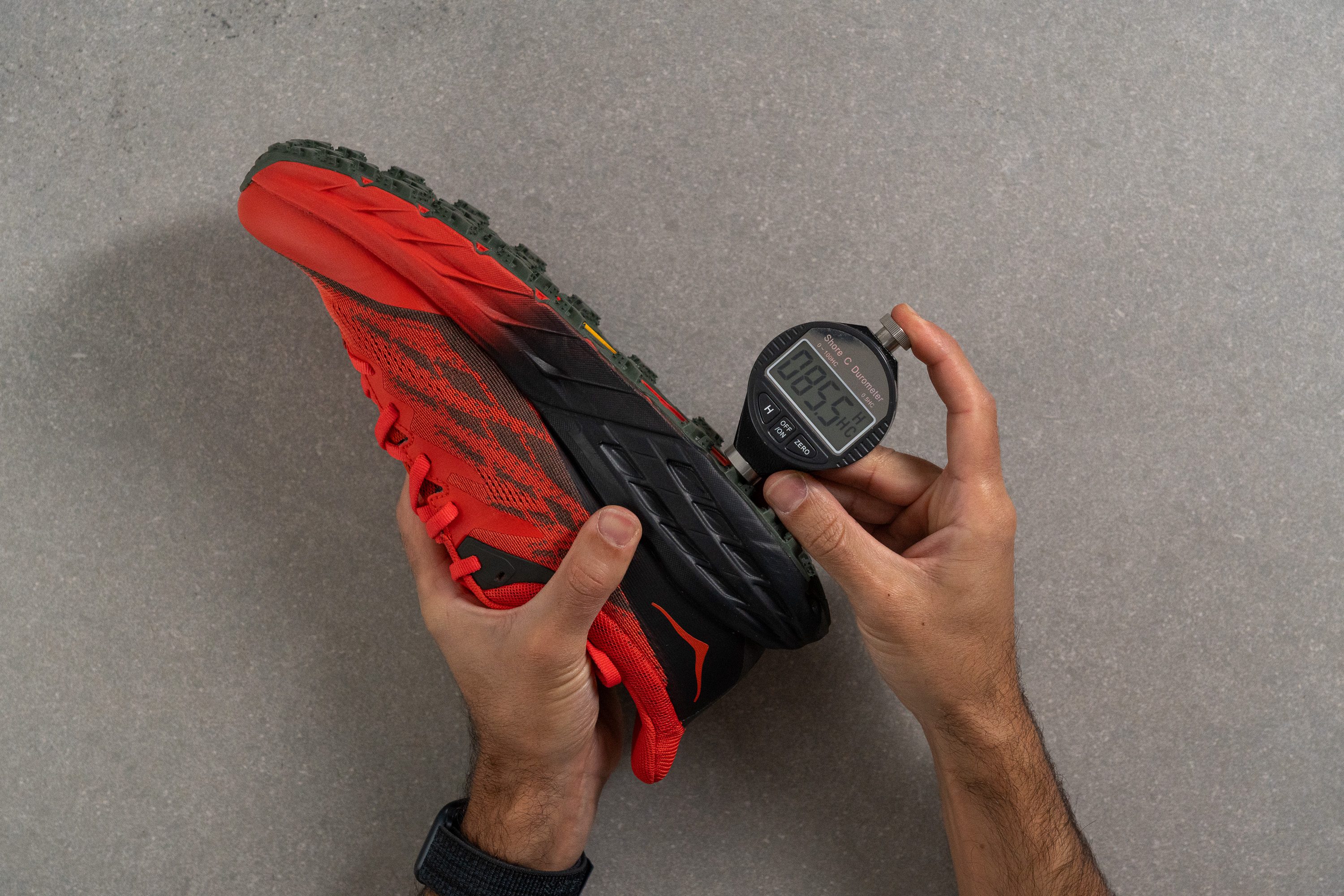
| Hoka Speedgoat 5 GTX | 86.0 HC |
| Average | 85.8 HC |
Outsole durability
In our final Dremel test, we put the rubber to the ultimate challenge.
After a brutal test, we examined the results—it was a draw! With a 1.1-mm indentation, the outcome was decent but not extraordinary.
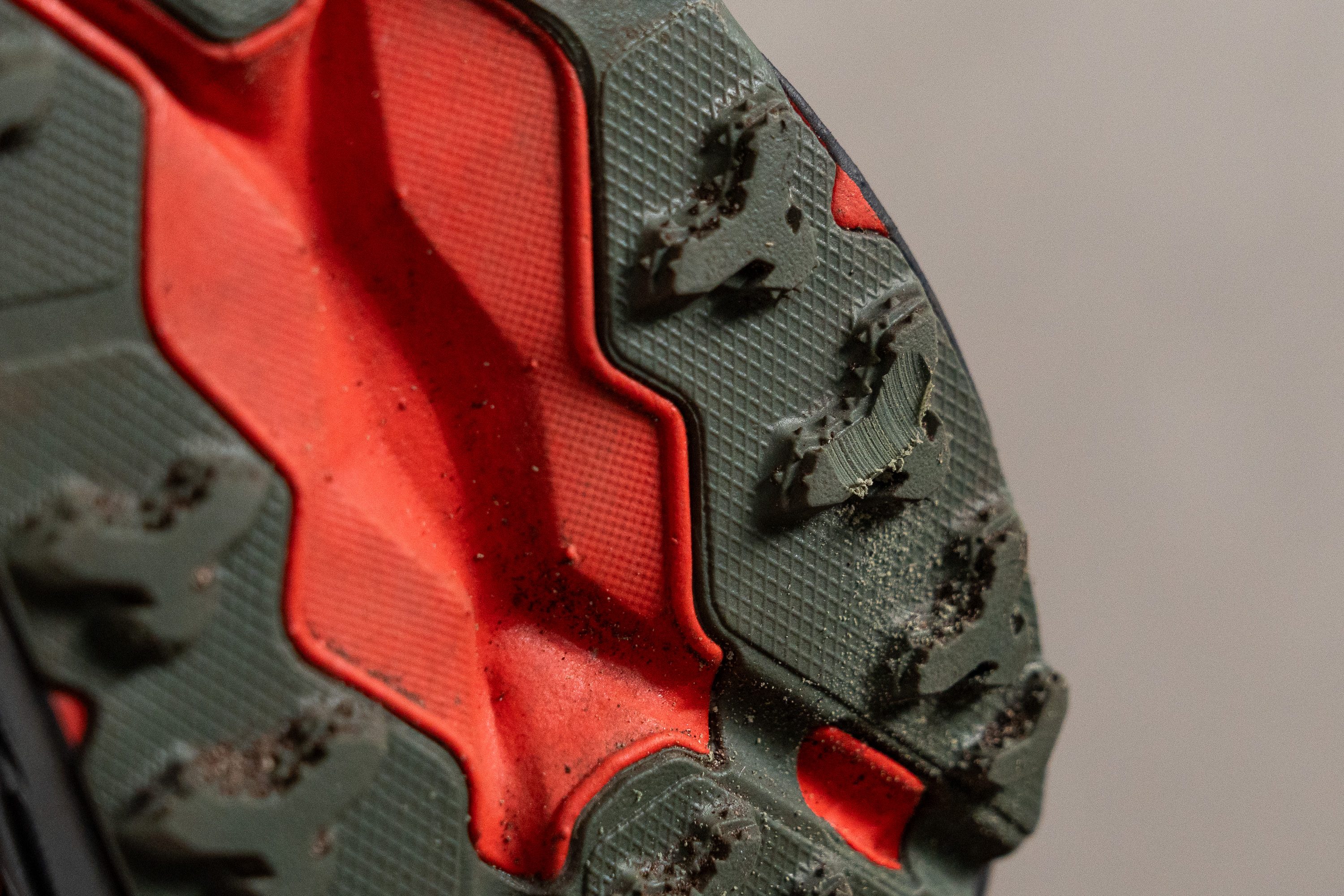
| Hoka Speedgoat 5 GTX | 1.1 mm |
| Average | 0.9 mm |
Outsole thickness
With a 2.5-mm thickness, the outsole of the Speedgoat 5 GTX has enough rubber to ensure long-lasting wear, judging from our previous results. There's nothing to worry about here, so let's move on.
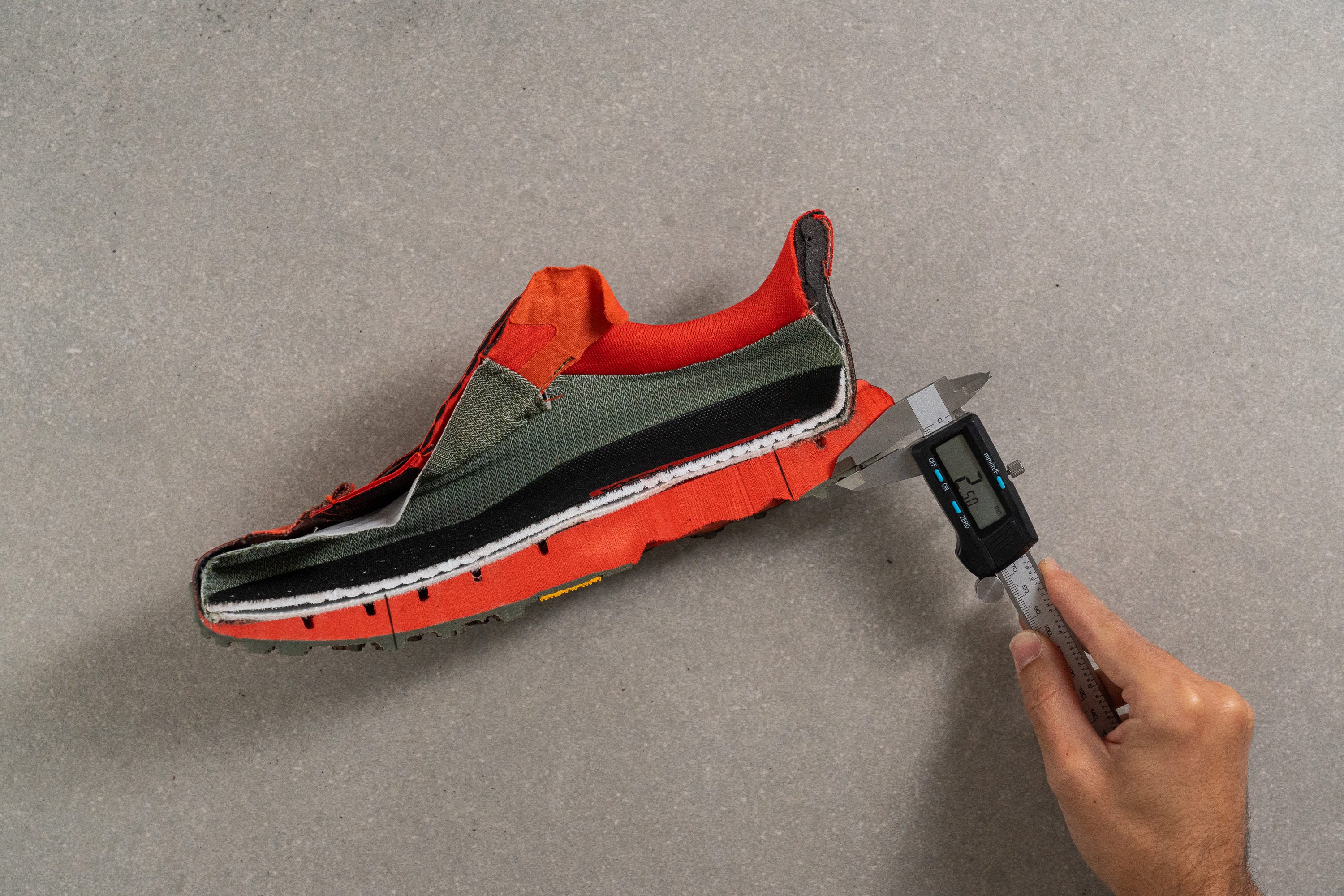
| Hoka Speedgoat 5 GTX | 2.5 mm |
| Average | 2.2 mm |
Misc
Insole thickness
Hoka uses an average insole in this model. It's pretty standard, feeling normal with a thickness of 4.5 mm, which is typical for most running shoes.
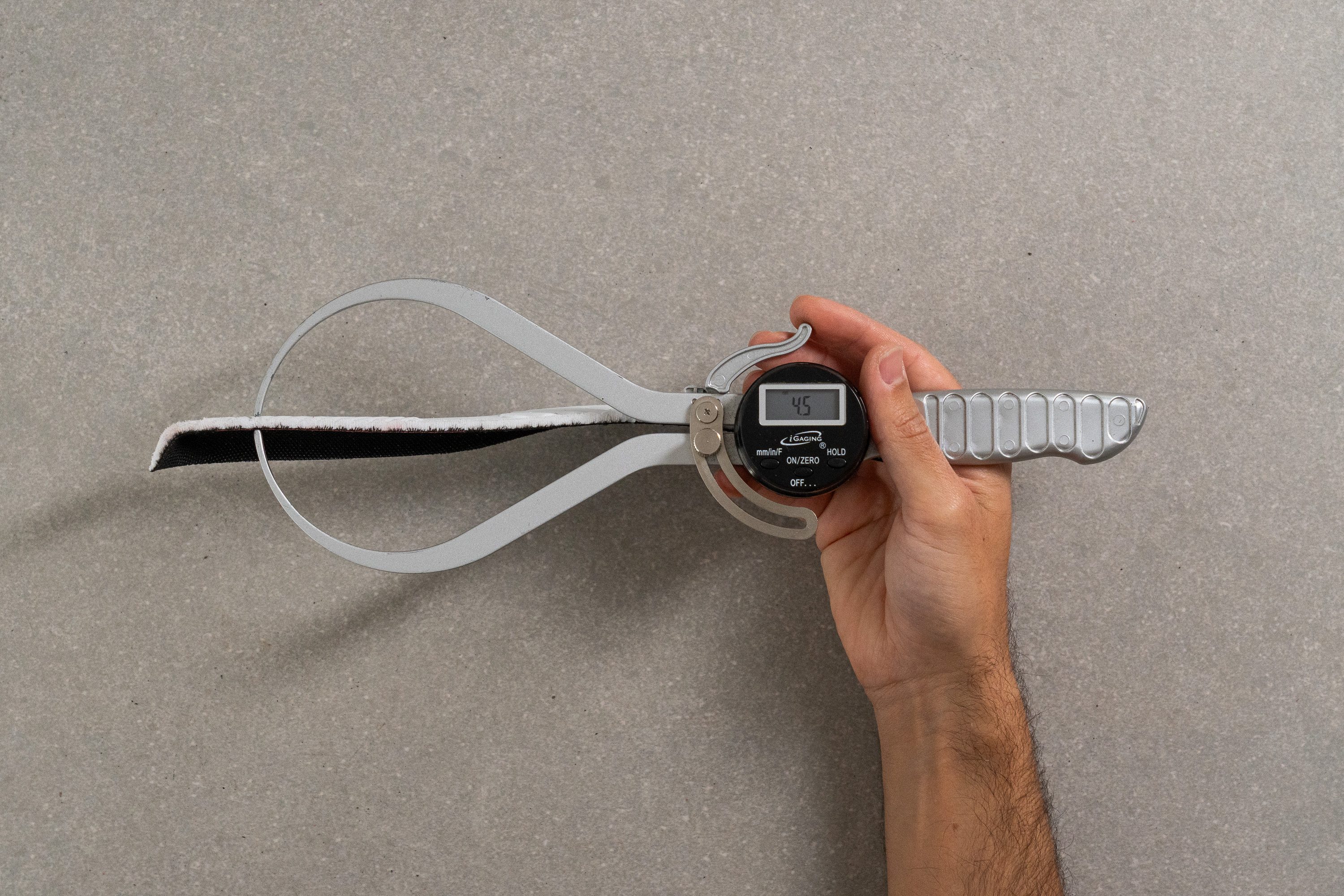
| Hoka Speedgoat 5 GTX | 4.5 mm |
| Average | 4.7 mm |
Removable insole
The insole is fully removable since it's not glued to the midsole, which is great!
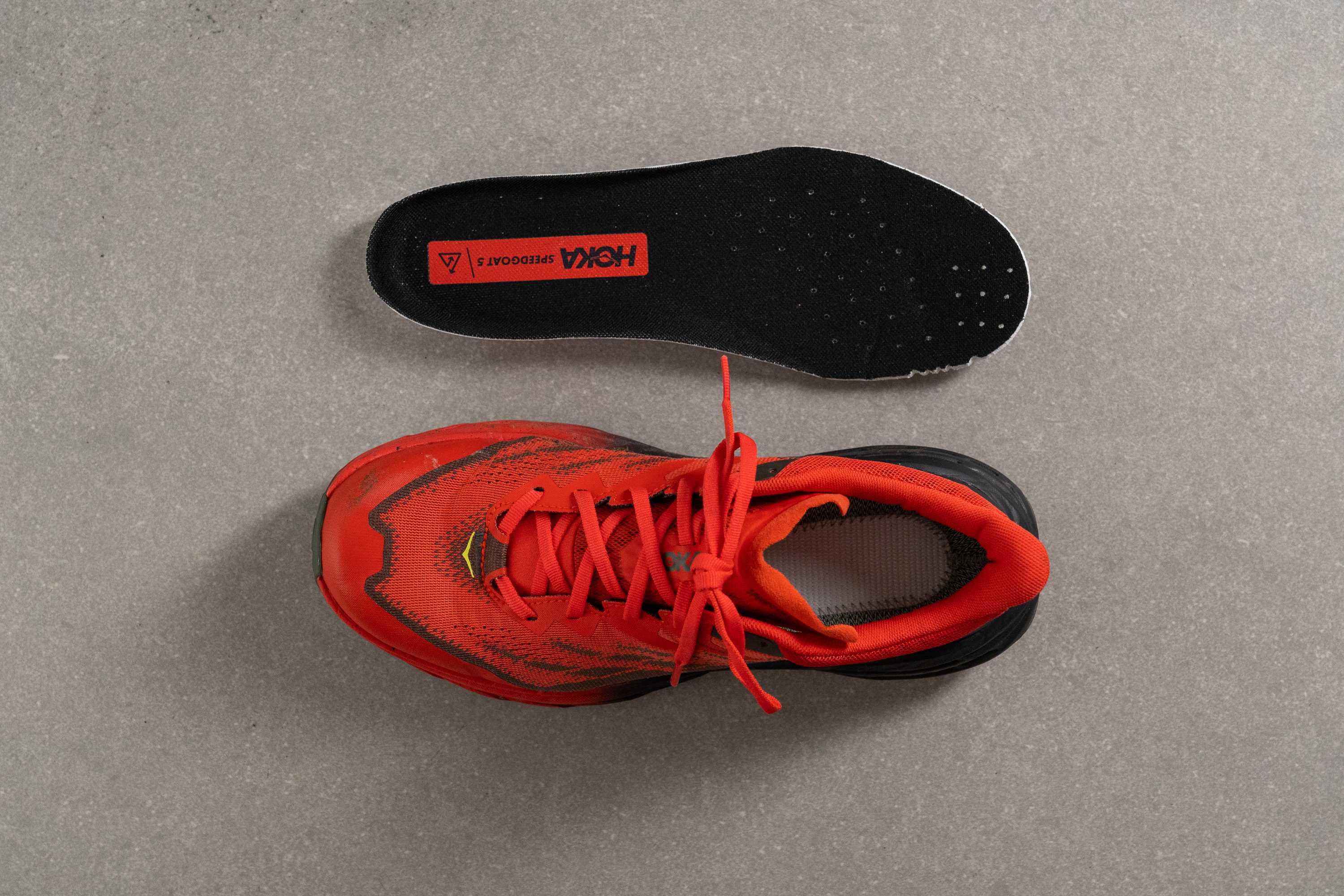
| Hoka Speedgoat 5 GTX | Yes |
Midsole softness in cold
To check how cold temperatures might change the Speedgoat 5 GTX feel, we put it in the freezer for 20 minutes before testing it once more.
After leaving the ice cream alone, the shoe was noticeably firmer, registering 30.3 HA on our test.
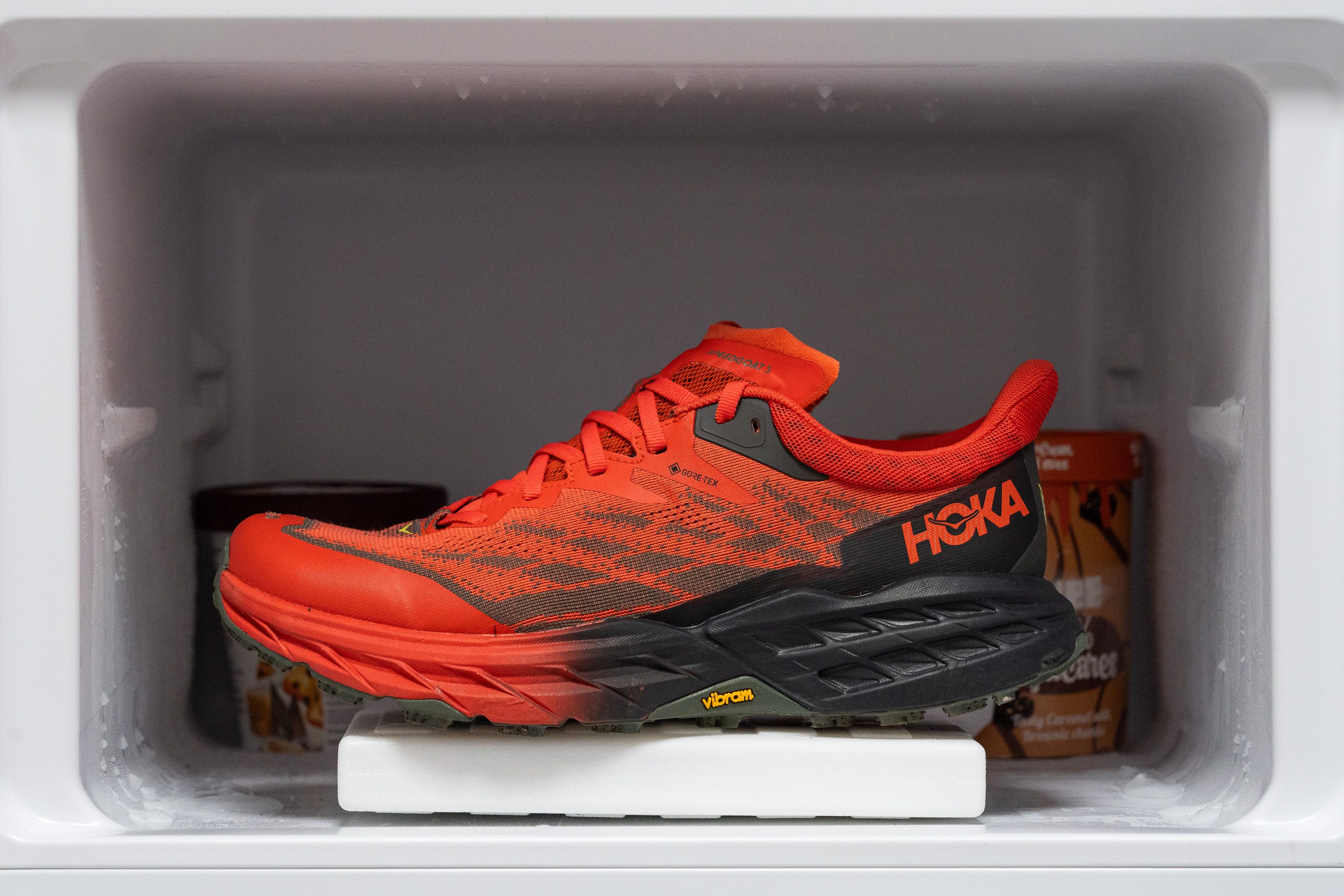
| Hoka Speedgoat 5 GTX | 30.3 HA |
| Average | 27.4 HA |
Midsole softness in cold (%)
This shows a mind-blowing 56.2% difference, which clearly highlights the underperformance of the CMEVA midsole in this test, just as we expected based on our research.
For a trail shoe with a premium, cold-resistant midsole, check the Saucony Endorphin Edge.
| Hoka Speedgoat 5 GTX | 56% |
| Average | 26% |
Reflective elements
Not having any reflective elements on a trail running shoe is a downside for us. We're not too keen on that.
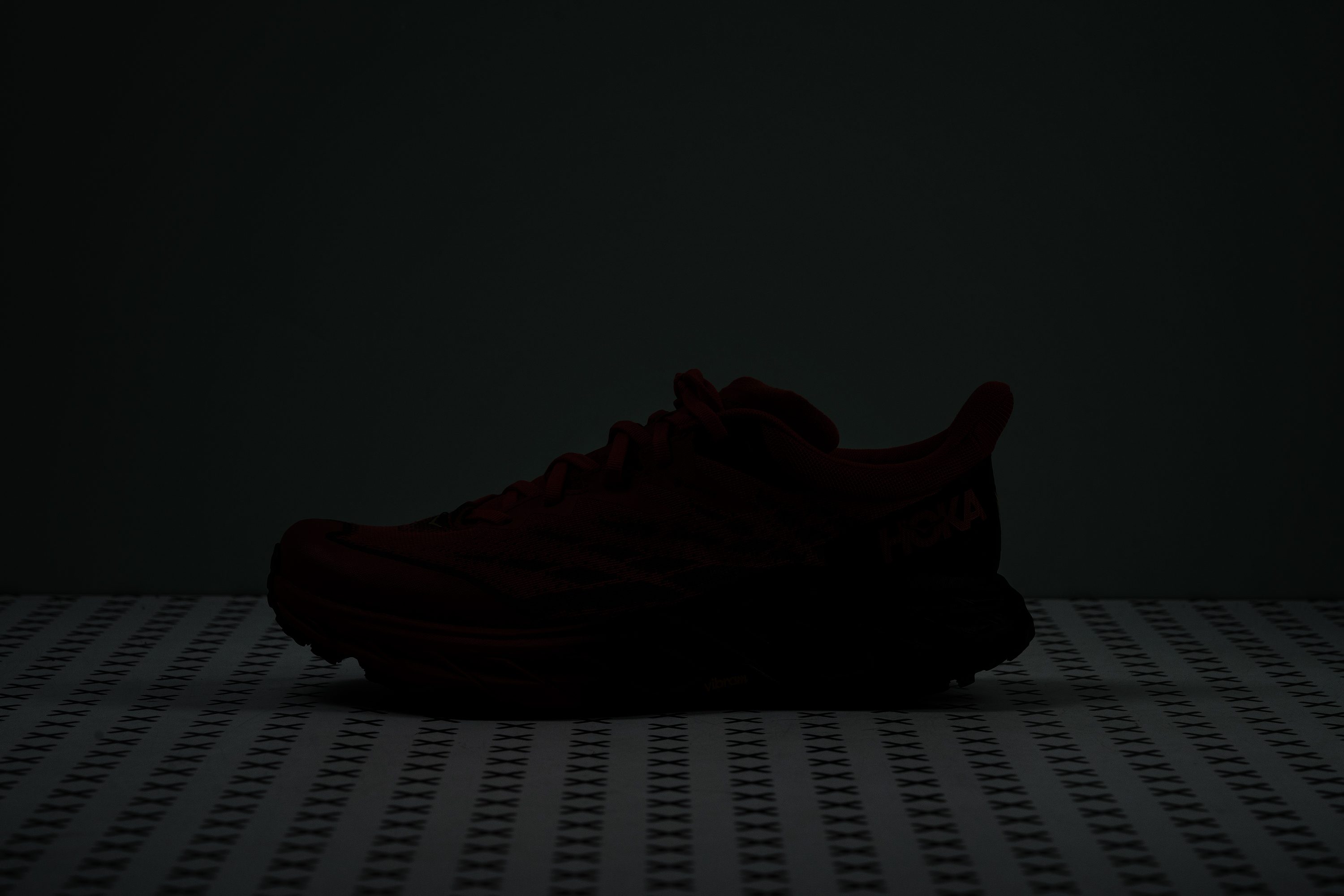
| Hoka Speedgoat 5 GTX | No |
Tongue padding
In the tongue padding department, the Speedgoat 5 GTX is quite lean, with only 2.9 mm of padding.
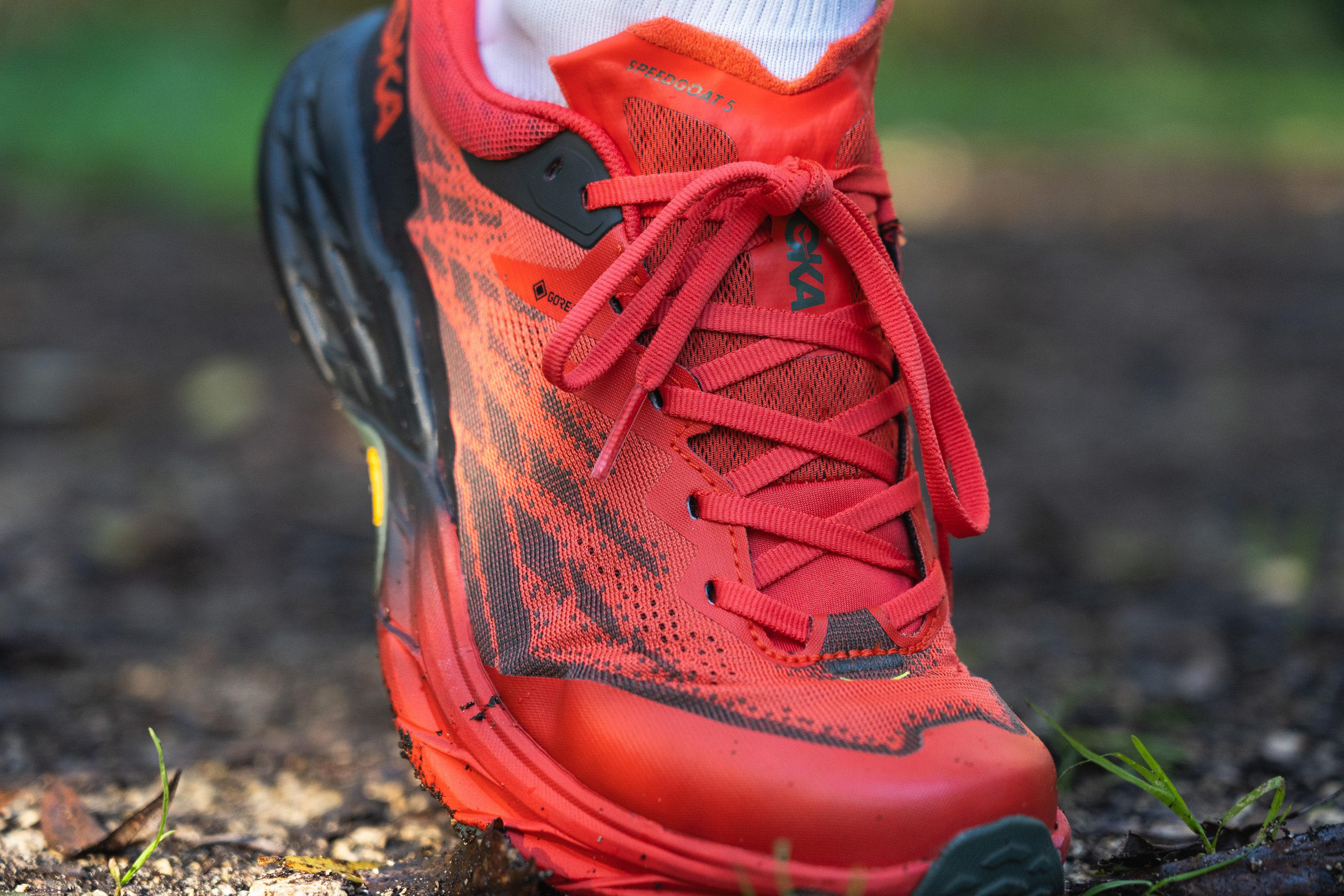
This is on the lower side, so those who often have issues with the instep should be careful when tightening the laces on this shoe. Or you can try an alternative lacing technique from our guide.
However, aside from that, it does its job well, providing great functionality and the added bonus of weight savings.
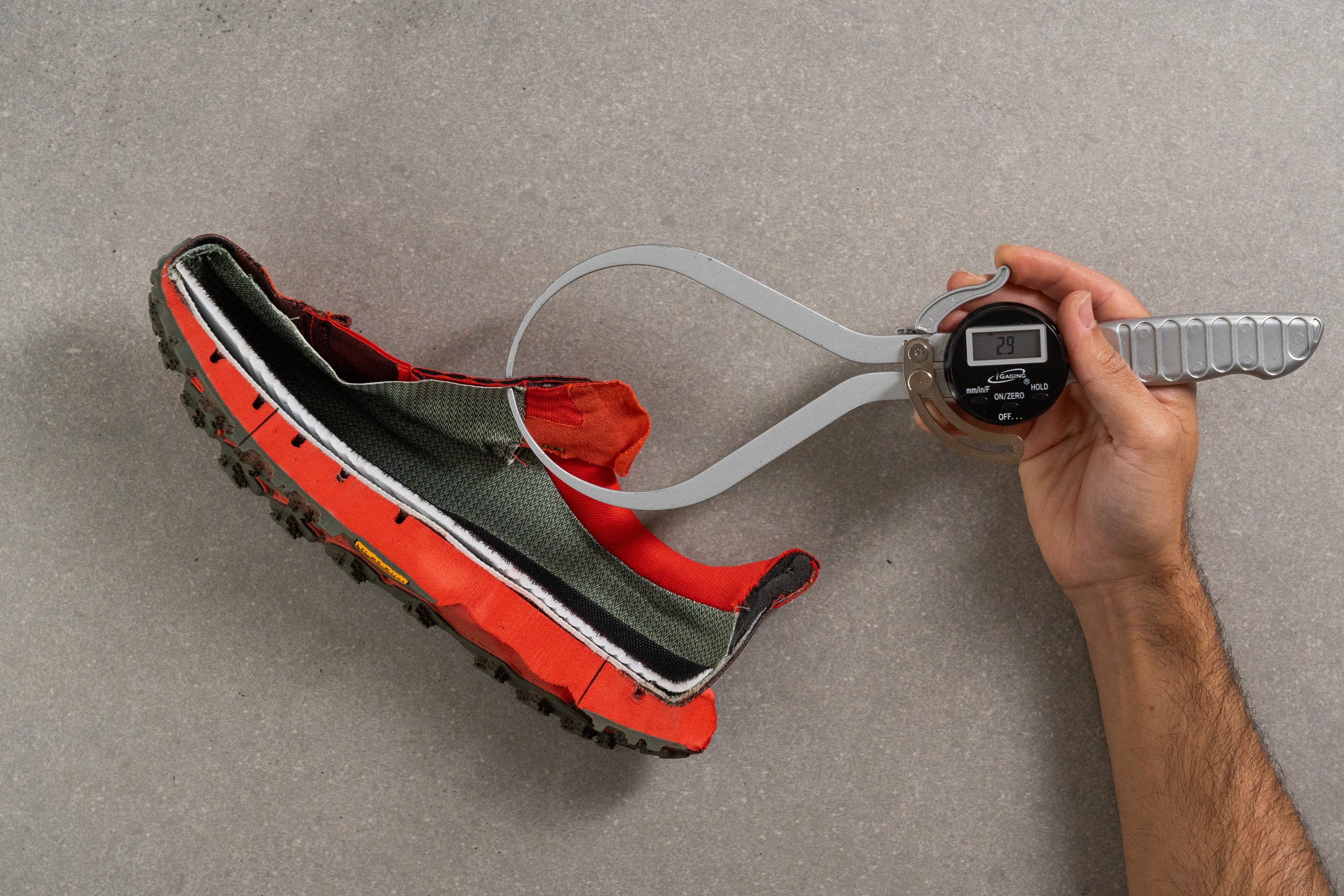
| Hoka Speedgoat 5 GTX | 2.9 mm |
| Average | 6.4 mm |
Tongue: gusset type
As a Gore-Tex shoe, we anticipated nothing less than a fully gusseted tongue, and Hoka certainly delivered.
With this feature, debris and water will have a tough time getting into the shoe.
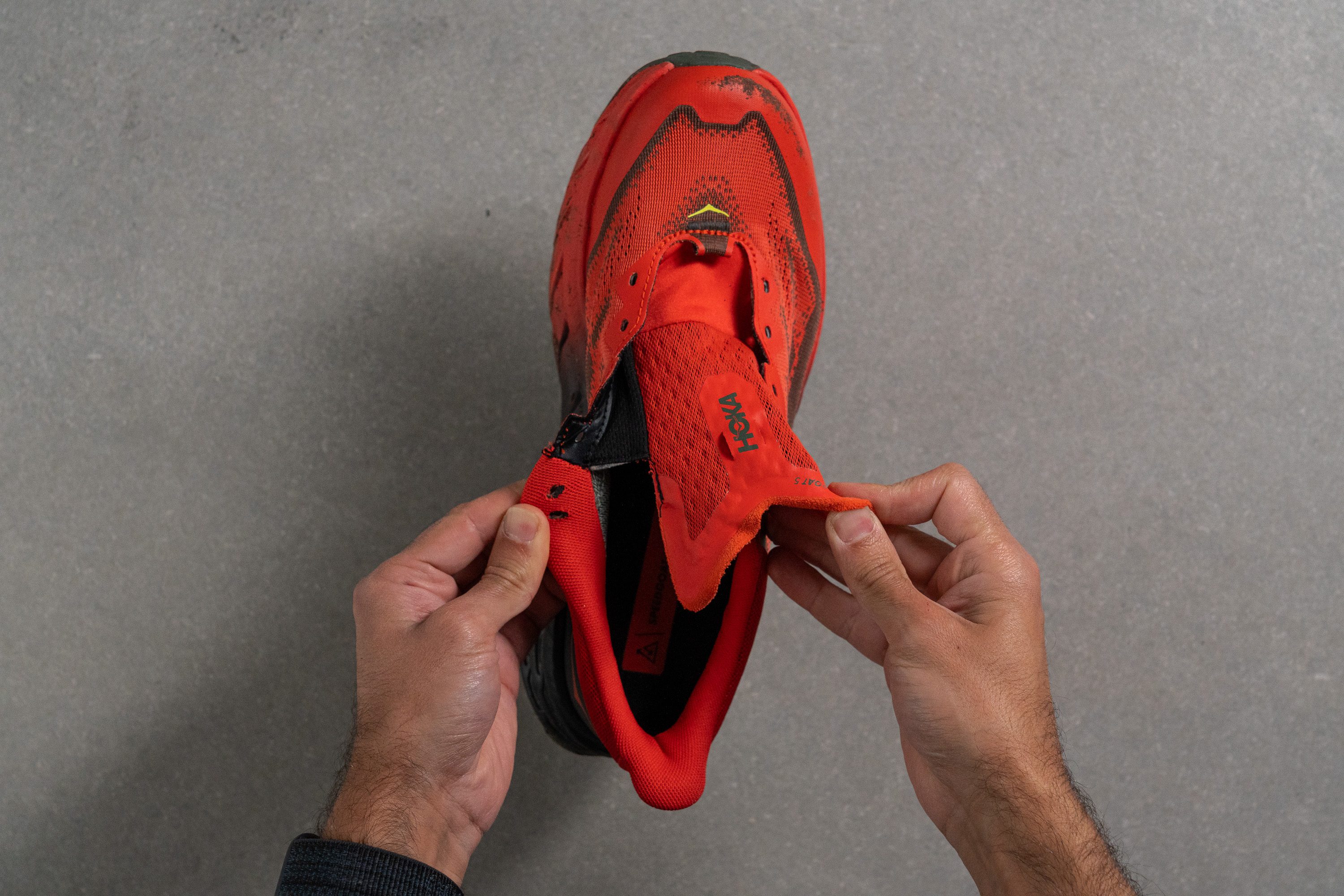
| Hoka Speedgoat 5 GTX | Both sides (full) |
Heel tab
The Speedgoat 5 doesn't have a heel tab, but like many Hoka shoes, it features a swallowtail that can be pulled if needed. It's not enough to call it heel tab, but you can definitely grab it.
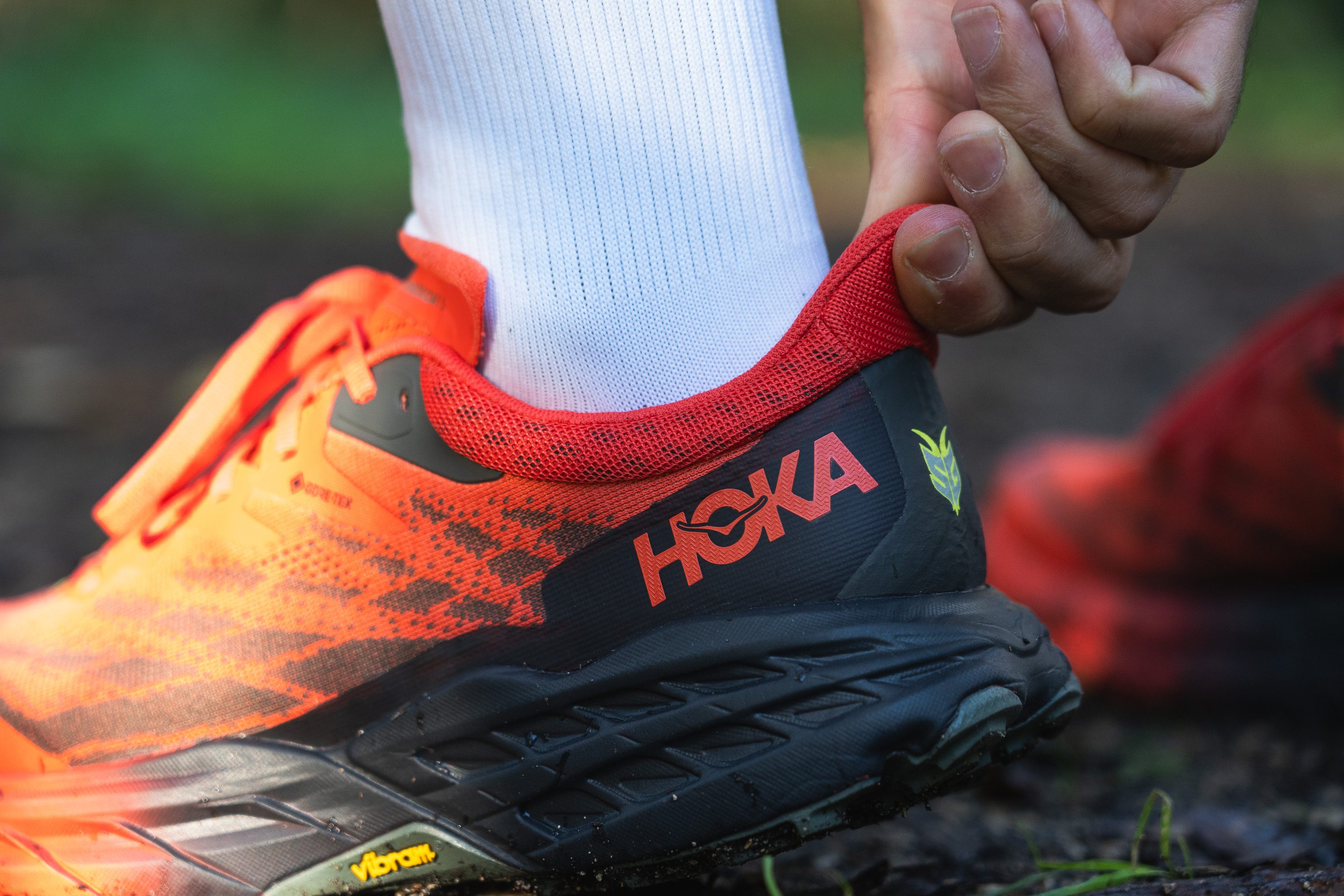
| Hoka Speedgoat 5 GTX | None |

